|
February 29, 2020 - No. 6
Stand
with Wet'suwet'en -- Might Does Not Make Right
Canada
Must Take Responsibility
and
Build a New Relationship
with Indigenous Peoples
-
Barbara Biley -
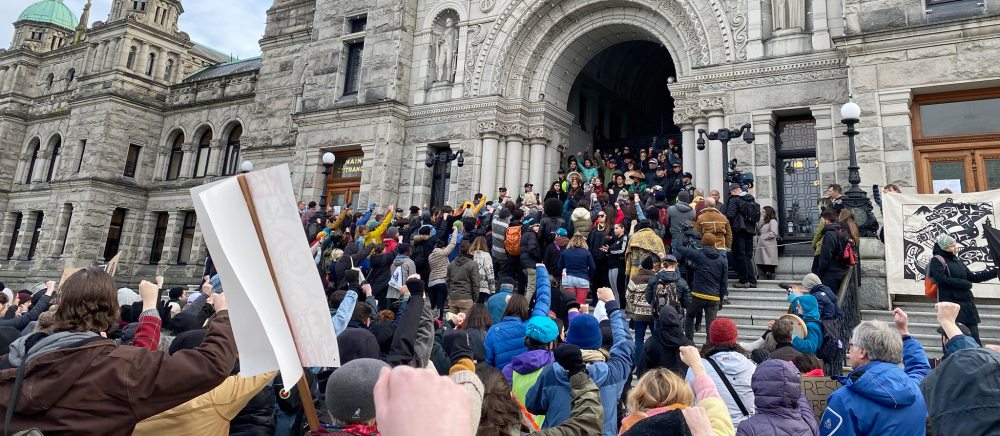
Indigenous youth re-occupy the entrance to the BC legislature, February
24, 2020.
• Actions Across Canada Condemn Police
Attacks on Blockades
• Statement
of
Indigenous Youth Standing
in Solidarity with
Wet'suwet'en
• Renewed Effort by
Quebec Premier to Criminalize
the Struggle of the Indigenous Peoples
- Pierre Soublière -
• Rule of Law
According to Public Safety Minister Bill Blair
- Philip Fernandez -
• Statement on
the Arrest of Documentary Filmmaker Melissa Cox
- Yint'ah Film
-
• Alberta's Critical Infrastructure
Defence Act Criminalizes the Affirmation of Rights
- Peggy Morton
-
Oppose Extraterritorial Application
of U.S. Sanctions Against Cuba!
• Open
Letter to François-Philippe Champagne,
Minister of Foreign
Affairs
- Canadian
Network on Cuba -
56th Annual Munich Security
Conference
• NATO War
Conference Vigorously Opposed
- Nick Lin
-
U.S.-Philippines Visiting Forces
Agreement
• People's
Forces Not Diverted
Communist Party of Vietnam's 90th
Anniversary
• Vietnamese
People Celebrate Momentous
Achievements of Their Party
• Celebration
in Toronto
Stand with Wet'suwet' en --
Might Does Not Make Right
- Barbara Biley -
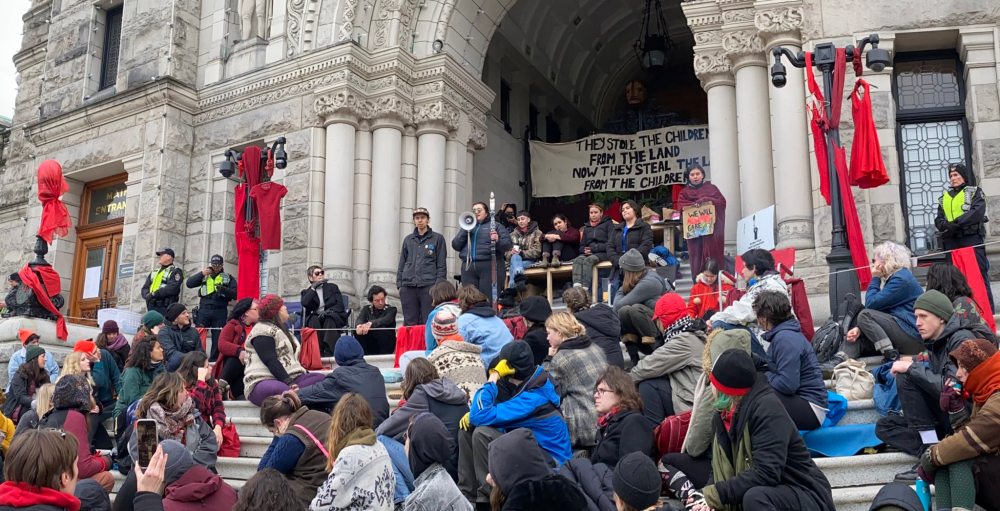
BC Legislature, February 25, 2020
It is the responsibility and duty of the federal
government
to provide the hereditary rights of Indigenous peoples with a
guarantee. This means that what the Trudeau and other governments
call Canadian rule of law cannot be the reference point to settle
disputes between the Crown and the Indigenous nations. So long as
this is the reference point, an end will not be put to colonial
and racist practices.
The stubborn refusal of the Trudeau government and
the
government of British Columbia to break with the racist and
colonial treatment of Indigenous people and nations is the
immediate cause of the growing actions in support of the
Wet'suwet'en people in British Columbia. Lip service to the
United Nations Declaration on the Rights of Indigenous Peoples
and repetition of the "most important relationship" are exposed
as just so many provocations. Instead of instilling hope, every
statement by Prime Minister Justin Trudeau and his ministers breeds
contempt and
resistance. And this is coupled with the continuing tragedy of murdered
and
missing Indigenous women and girls, the over-representation of
Indigenous people in the prison system, the unacceptable living
conditions on reserves and, particularly, the
conditions that have caused an epidemic of youth self-harm and
suicides.
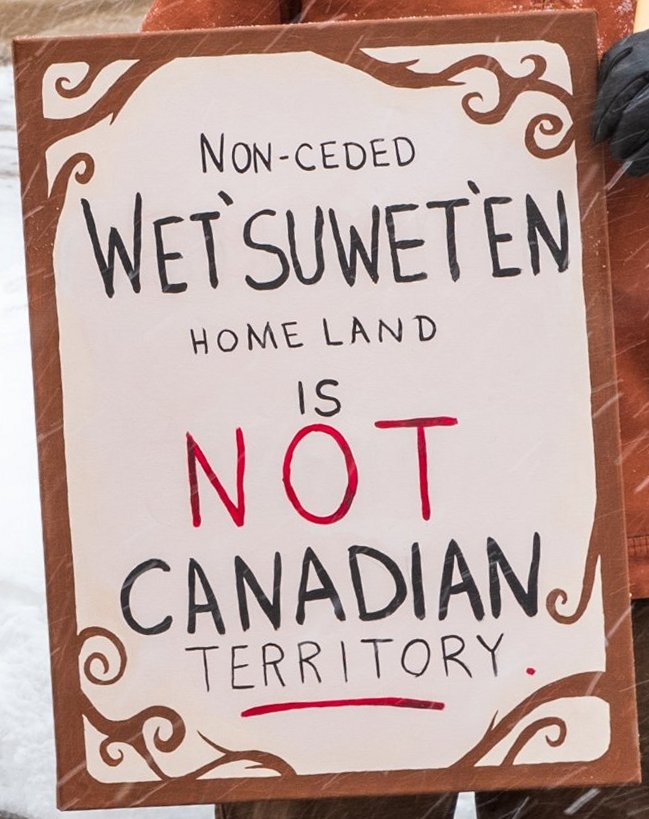 Since
early
January, the Wet'suwet'en hereditary chiefs have
been asking for federal and provincial government leaders to meet
with them on a nation-to-nation basis. Trudeau, until February
18,
refused to acknowledge that the federal government, which he leads, had
any responsibility to address the situation of
the violation of rights on Wet'suwet'en territory. BC Premier
John Horgan has also refused to meet with the Wet'suwet'en chiefs
and has repeatedly stated that, regardless of what anyone says or
thinks, the pipeline will be built, indicating that he too
disrespects the chiefs and the responsibility of the government
he leads to break with the old relations and establish new
relations. Since
early
January, the Wet'suwet'en hereditary chiefs have
been asking for federal and provincial government leaders to meet
with them on a nation-to-nation basis. Trudeau, until February
18,
refused to acknowledge that the federal government, which he leads, had
any responsibility to address the situation of
the violation of rights on Wet'suwet'en territory. BC Premier
John Horgan has also refused to meet with the Wet'suwet'en chiefs
and has repeatedly stated that, regardless of what anyone says or
thinks, the pipeline will be built, indicating that he too
disrespects the chiefs and the responsibility of the government
he leads to break with the old relations and establish new
relations.
The demands of the Wet'suwet'en hereditary chiefs
are
straight-forward: the RCMP must withdraw from Wet'suwet'en
territory, which means removing their mobile base and officers, who
continue to harass and intimidate Wet'suwet'en and
their supporters on the land, and that Coastal GasLink ceases
activity on the land while discussions between the Wet'suwet'en
hereditary chiefs and the federal and provincial governments take
place. It is in support of these demands that the railway
blockades in Ontario, Quebec and other places were set up, to
express the solidarity across the country with the just demands
of the Wet'suwet'en.
The government says it wants a peaceful resolution
but keeps
on criminalizing everyone, Indigenous and non-Indigenous, who are
taking action in support of the just and legal request of the
Wet'suwet'en hereditary chiefs. Every attempt is made to
insinuate that while Wet'suwet'en might have legitimate grievances, as
Trudeau put it in his press conference on February 21,
non-Indigenous people do not. In other words, the matter is not
of a
Constitution that requires renovating, and
upholding Indigenous
hereditary rights is of no concern to Canadians. It shows the backward
outlook of
those in power in Canada, which is made all the more
anachronistic
the more
they declare that either the Indigenous and non-Indigenous submit
to the law and order agenda or they will face the full force of
the law.
The Ontario Provincial Police arrests of
Tyendinaga Mohawk, and
injunctions and
threats against others across the country, show that the only
"peaceful resolution" that the government wants is one in which
Indigenous people agree to the violation of their rights. That is
not peace and it will not pass! Might DOES NOT Make Right.
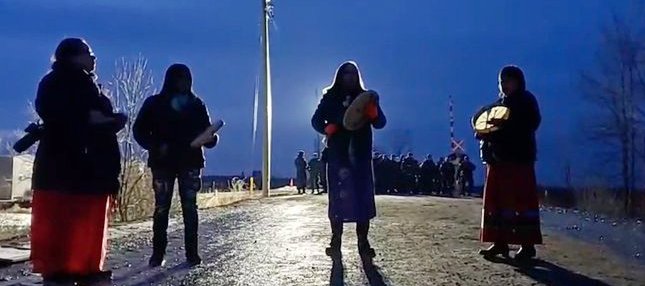
Police attack and dismantle the Tyendinaga blockade, February 24, 2020.

In the hours after the police attack, arrests and
dismantling of the Tyendinaga blockade in Ontario, more actions of
resistance followed. The Gitxsan re-established a blockade of the CN
rail line in northern BC that had been taken down on February 13 with
the
understanding that discussions between the Wet'suwet'en and the federal
government would take place. The RCMP arrested several people,
including Gitxsan hereditary chiefs, at that blockade. Others then shut
down Highway 16 in northern BC demanding the release of those arrested.
Blockades of the Port of Vancouver continued, in defiance of an
injunction, and Indigenous and other youth are occupying the steps of
the BC legislature. In towns and cities across the country rallies and
demonstrations are taking place.
There are road and rail
blockades in the Mohawk communities of Kanesatà:ke and
Kahnawà:ke
in Quebec which have been in place for some time. On February 25,
a Quebec court granted CP an injunction requiring the
dismantling of a barricade on the rail line through
Kahnawà:ke.
Enforcement there is the responsibility of the Mohawk Peacekeepers
police service which has said that it has no intention of
carrying out the court order. Quebec Premier François
Legault declared,
with no proof whatsoever, that dismantling that blockade is dangerous
because of the presence of AK-47s, which is
categorically denied by the Peacekeepers. Legault said that the
Sûreté du Québec is working on a plan
to bring down the
barricades. Authorities openly admit that police actions
to dismantle blockades has resulted in new actions in other
locations.
Violent repression of unarmed demonstrators
standing in
solidarity with the just demands of the Wet'suwet'en will not succeed
in convincing anyone that the state is in the right. The Wet'suwet'en
are defending their hereditary rights as well as the well-being of
Mother Earth, which appeals to those who are concerned about the
despoliation of the natural environment, and are asking for
nation-to-nation dialogue. The onus is on Canada to uphold the
hereditary rights of Indigenous peoples. That is the path to peaceful
resolution of outstanding conflicts.
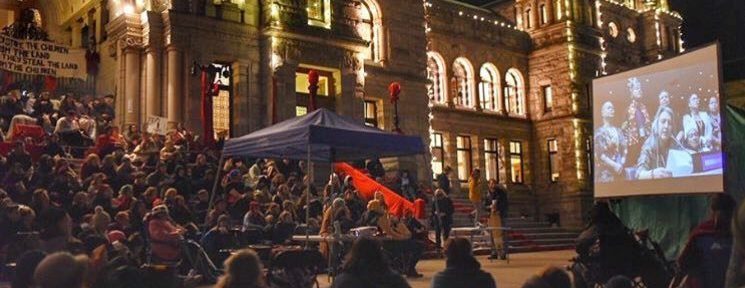
Victoria, BC

Saanich, BC

Vancouver, BC
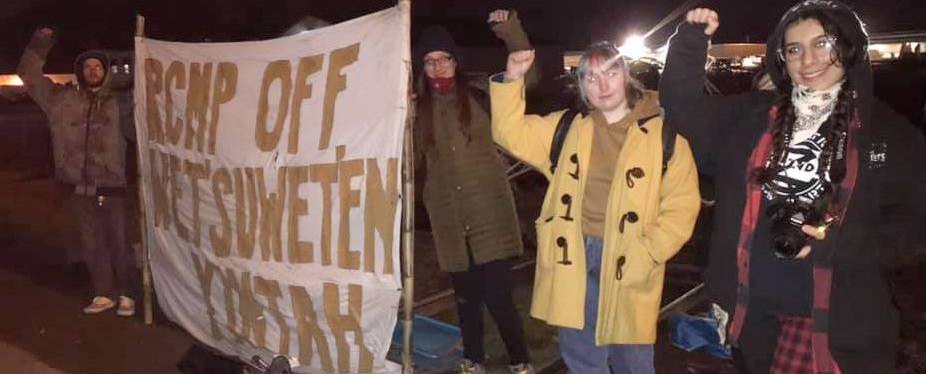
Abbotsford, BC

Winnipeg, MB
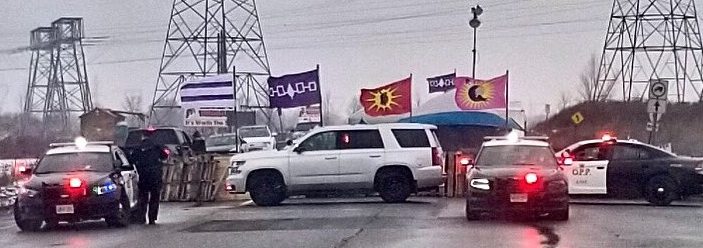
Six Nations of the Grand River Territory

Hamilton, ON
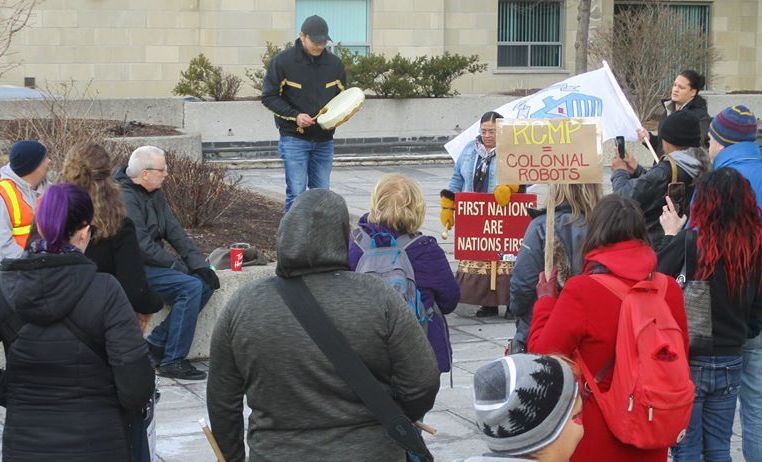 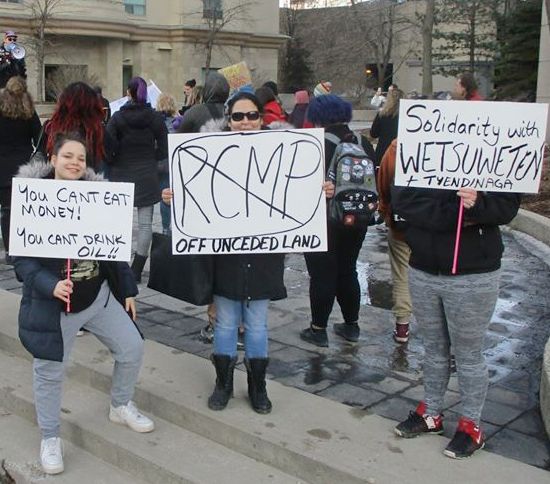
London, ON

Toronto, ON, rally and round dance.
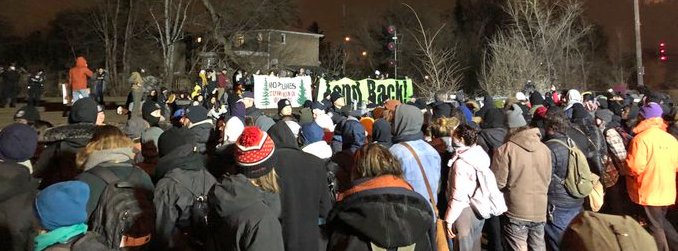
Toronto, ON, rail blockade

Orillia, ON
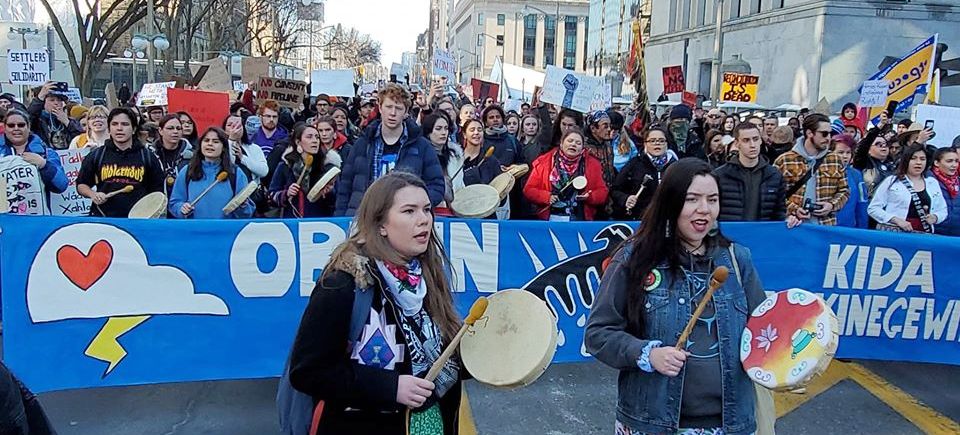
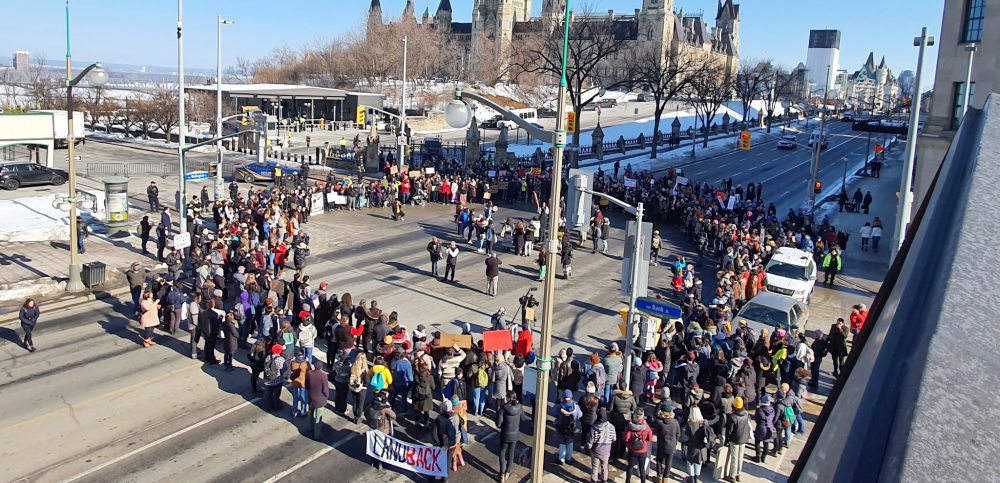
Ottawa, ON

Kanesatà:ke Mohawk Territory
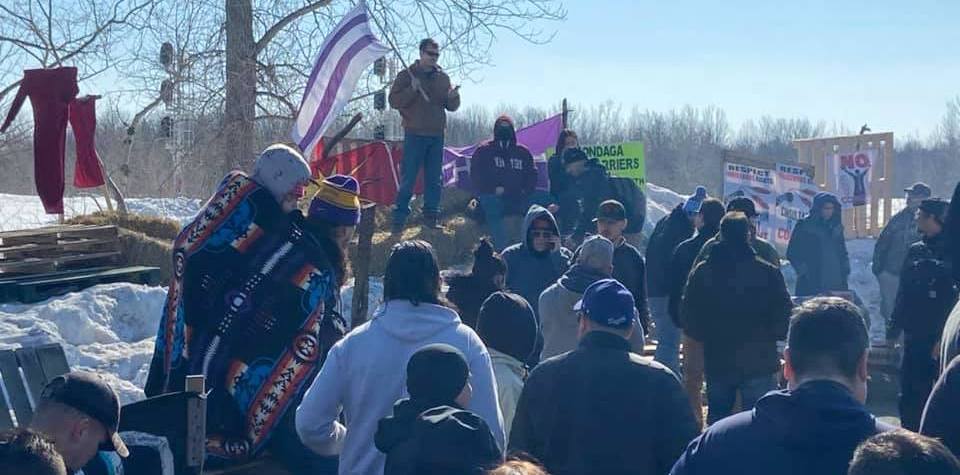
Kahnawà:ke, Mohawk Territory
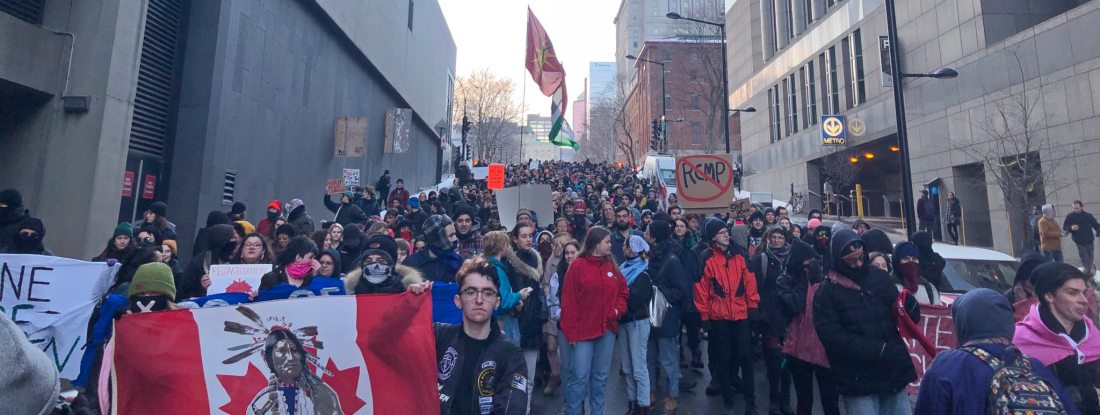
Montreal, QC
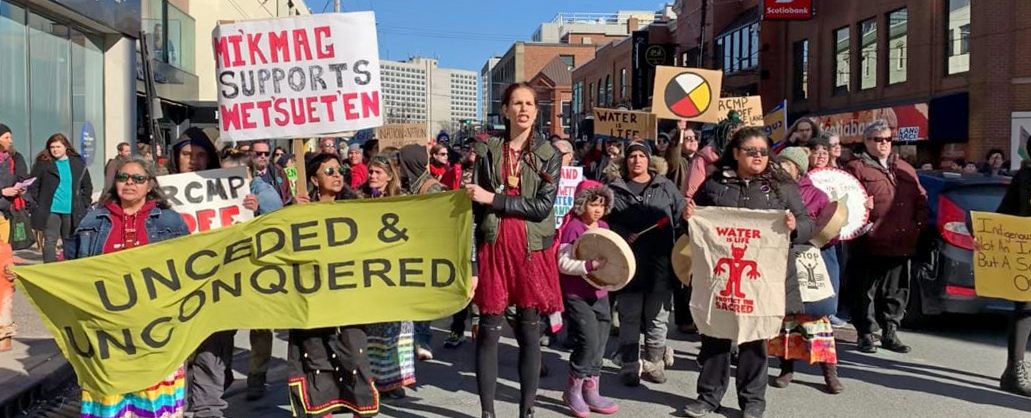
 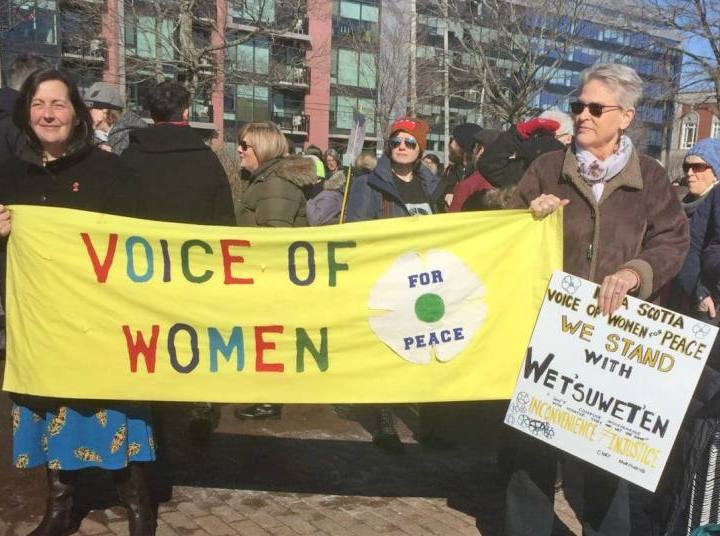

Halifax, NS

Fredericton, NB

St. John's, NL, occupation of MP Seamus O'Regan's
office.

 
Youth hold press conference on the steps of the BC Legislature,
February 26, 2020.
These are demands for Canada, for BC, for
Canadian
officials. We are Indigenous youth from nations across Canada
standing independently in solidarity with all five clans of the
Wet'suwet'en nation who have unanimously rejected the Coastal
GasLink (CGL) project. In standing with our Wet'suwet'en relatives we
will occupy Ministry offices, rail lines and legislative and
parliamentary precincts in order to hold all levels of the
Canadian government responsible for their perpetuation of
Canada's genocidal legacy. We are committed to holding Canadian
officials accountable. This means continually returning to the
spaces of governance and law until Canada abides by Wet'suwet'en
traditional governance and law. It is our inherent responsibility
as Indigenous youth to resist injustice and defend Wet'suwet'en
sovereignty. We recognize that the Wet'suwet'en upholding their
responsibilities to lands, waters and climate justice protects
our collective futures.
Indigenous youth stand in solidarity with all
Indigenous
peoples defending their lands across Canada, from Wet'suwet'en to
Tyendinaga. We resist the Royal Canadian Mounted Police and
Ontario Provincial Police violently criminalizing Indigenous
peoples for demanding a bare minimum of Canada. Through these
shameful arrests the world has witnessed the colonial façade
of
reconciliation come crashing down to expose the Canadian reality
of Indigenous genocide that has never been interrupted or
reconciled. Indigenous youth across the country declare that
reconciliation is dead. We condemn the coercive tactics employed
by CGL, the lack of meaningful dialogue from the Canadian state,
and the overall attempted erasure of Indigenous rights, title and
law.
The situation on Wet'suwet'en territory has
revealed the true
nature of Canada's predatory consultation practices. It has been
made clear that the Indigenous nations do not have the right to free,
prior and informed consent. The ongoing raid against the
Wet'suwet'en shows that saying NO results in a paramilitary
invasion. Good faith negotiations do not look like seizing
Indigenous lands at gunpoint while simultaneously denying
critical programs and services for our communities. Not only is
the RCMP raid of Wet'suwet'en territories a coercive force on
behalf of Coastal GasLink, but so is the systemic treatment of
Indigenous peoples in Canada.
Our communities should not be subject to predatory
consultation practices that exploit cycles of poverty that Canada
intentionally maintains, meanwhile generating immense wealth from
our territories since colonization. Boil water advisories, near
extermination of traditional foods like wild salmon, caribou and
buffalo, as well as underfunded social, health and education
programs accessed by regular Canadians are all coercive
conditions for negotiations with industry. This is the
inescapable economic component of ongoing colonization. There is
undue pressure for Indigenous nations to engage in impact benefit
agreements/mutual benefit agreements with environmentally
destructive projects. The economic oppression of colonization is
leveraged by corporate interests and supported by the government.
The impact benefit agreements negotiations are a corrupt process.
This is not equivalent to true consent.
Our human rights as Indigenous peoples are
inherent and cannot
be contingent upon a transaction and annihilation of our lands.
As Indigenous youth we will do everything in our power to protect
our future and Wet'suwet'en lands from destruction. It's time for
Canadian officials to do the same. If you do not stand with us
you are complicit in ongoing injustice. Our generation and all
future generations of our nations will remember those who took a
stand against genocide. We will also not forget those who were
complacent in ongoing colonial acts of violence.
We demand that the leadership of British Columbia
and Canada
enter into nation-to-nation discussions with the Wet'suwet'en
hereditary chiefs. In order for these discussions to take place
in good faith and without duress, the Royal Canadian Mounted
Police must be withdrawn from Wet'suwet'en territories. All
ongoing RCMP patrols and surveillance must also cease. The
removal of the Community Industry Safety Office will not satisfy
this requirement unless all RCMP activities are discontinued.
Coastal GasLink must cease activity and withdraw personnel from
Wet'suwet'en territories in accordance with the eviction [order] that
was
issued by Wet'suwet'en hereditary chiefs on January 4, 2020.
Canada must critically examine how the systemic treatment of
Indigenous peoples in Canada is a coercive factor in negotiations
with industry. There can be no free, prior and informed consent
while many Indigenous nations in Canada still have boil water
advisories. British Columbia must revoke all permits granted to
CGL, especially in light of the BC Environmental Assessment
Office's rejection of CGL's technical data report. British
Columbia must also cease its defamation and criminalization of
Indigenous leaders and governments. The inflammatory rhetoric of
the BC Premier only serves to incite hate and violence against
Indigenous peoples standing up for our inherent rights and
livelihoods. Canada must cease the criminalization of all
peaceful Indigenous solidarity actions and blockades that exist
because of Canada's failure to adhere to diplomacy and meet with
Wet'suwet'en hereditary chiefs. Call off OPP from Tyendinaga
Mohawk territory. It is time for you to act upon your
responsibilities.

- Pierre
Soublière -

Wet'suwet'en hereditary chiefs pay a visit to Mohawks of
Kahnawà:ke to
express appreciation for their solidarity in defence of Indigenous
sovereignty and rights, February 22, 2020.
With his most recent declaration about dangerous
weapons on the Mohawk territory Kahnawà:ke, the Quebec
Premier
François Legault is continuing his rant.
He
seems to want to contribute at any cost to criminalizing
the just and courageous struggle of the Indigenous peoples. This is the
definitive modus
operandi
of what are called the democratic
institutions which cannot solve any of the historic social or
political problems. Solutions to these problems must be based on the
recognition of Indigenous rights and must give rise to the new
harmonious and respectful relations among us that everyone longs for,
as opposed to this hate-fueling and sowing of division, and
attempts to stop dissident voices.
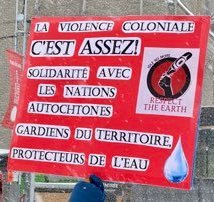 As the TML
Weekly of February
22 aptly pointed out, the
workers and people of Quebec have a lot of experience with such
criminalization of resistance and struggles for rights.
Exasperated, Legault claims that he "understands that there must
be dialogue." But this criminalizing of struggles is aimed
precisely at stopping all dialogue and discussion, and to
misrepresent the Indigenous peoples by claiming there are "extremist"
elements in their midst and thus divert attention from
the necessity to respect the hereditary rights of the
Wet'suwet'en and put an end to old colonial arrangements based,
among other things, on a racist and outdated Indian Act. As the TML
Weekly of February
22 aptly pointed out, the
workers and people of Quebec have a lot of experience with such
criminalization of resistance and struggles for rights.
Exasperated, Legault claims that he "understands that there must
be dialogue." But this criminalizing of struggles is aimed
precisely at stopping all dialogue and discussion, and to
misrepresent the Indigenous peoples by claiming there are "extremist"
elements in their midst and thus divert attention from
the necessity to respect the hereditary rights of the
Wet'suwet'en and put an end to old colonial arrangements based,
among other things, on a racist and outdated Indian Act.
Legault and others probably have no interest in
recalling that
at certain moments in our history, Quebec missed opportunities to
forge an alliance with the Indigenous peoples in opposition to the
Anglo-Canadian state, such as the 1982 constitutional
repatriation from which the Quebec government and Indigenous nations
were excluded. At that time, Georges Erasmus, President of the
Assembly of First Nations, made a vibrant appeal to then-Premier of
Quebec René Lévesque, asking that
Quebec and the Indigenous peoples join forces and form a common front
against the
constitutional process taking place.
"We Indigenous peoples," he declared, "have been,
along with
Quebec, pushed under the rug of the country Trudeau and his
stooges from the English provinces have just constituted. I call
upon the Quebec government and people, and René
Lévesque in
particular, to react to this matter and speak out on the question
of the rights of the Indigenous populations to
self-determination. I am putting the Quebec people to the test --
if, in fact, the people believe in self-determination -- the time
is now to support the Indigenous peoples. It is not the time to
stay divided and to head individually towards defeat. The time to
act is now. The time has come. First Nations need the support of
Quebec in the hours to come. We need the support of the Quebec
people. The country is in a state of national emergency which
demands that First Nations and Quebeckers join in a common
force."[1]
At that time, the Quebec government refused its
support, and
decided against forming an alliance with the Indigenous peoples. Such
an alliance is needed once again. But rather than being created
by today's democratic institutions, it will be forged in the
unity in action of the Quebec workers and people and the Indigenous
peoples in the historical struggle for the renewal of the
democratic institutions and for constitutional arrangements that are
based
on, among other things, compensation for historical wrongs,
nation-to-nation relations, and a free union -- in other words,
principles in step with a modern society.
Note
1. As raised in Sur la piste du Canada
errant, Jean
Morisset (2018), p.355.

- Philip Fernandez -
On February 23, Public Safety Minister Bill Blair
spoke on
CBC's radio program Cross
Country Checkup about policing the
Wet'suwet'en people, who are waging a determined struggle to
affirm their sovereignty and rule of law on their traditional
territory, with
the support of the Canadian people from coast to coast to coast.
 On air, Minister
Blair contradicted Wet'suwet'en Hereditary Chief Woos who had said
earlier on the same
program: "We will not talk with the government until the RCMP are
completely out of our territorial land. We're not going to talk
with a gun pointed at our heads. That's not the way to do it."
Chief Woos noted as well that, rather than de-escalating
the situation, the RCMP had increased surveillance and made
more arrests. On air, Minister
Blair contradicted Wet'suwet'en Hereditary Chief Woos who had said
earlier on the same
program: "We will not talk with the government until the RCMP are
completely out of our territorial land. We're not going to talk
with a gun pointed at our heads. That's not the way to do it."
Chief Woos noted as well that, rather than de-escalating
the situation, the RCMP had increased surveillance and made
more arrests.
Minister Blair asserted that Chief Woos had got it
all wrong
and that the RCMP had decamped to nearby Houston but were
continuing to patrol the area, completely ignoring the point that
continuing to patrol the area means the RCMP have not left
Wet'suwet'en territory. When pressed by the CBC program host that
Houston was in fact in Wet'suwet'en territory and reminding him
that Chief Woos had said: "Out means Out," Minister Blair
asserted: "No. Let me be very clear. There is no place in Canada
that can be deprived of the service and protection of the police.
The police have a responsibility in every place in Canada to
uphold the rule of law."
In an arrogant fashion -- when asked by the
program host:
"... so how are the police supposed to minimize the use of force
and act as peacekeepers in the situation they're now in?"
-- Minister Blair replied, "... As you know, I was a police officer
for 39 years and I have actually attended quite a number of these
protests, and I know exactly what that framework for dealing with
critical Aboriginal incidents says, and how the police have been
trained to respond. They are absolutely committed to resolving
this peaceably as have we, in all of our discussion....The prime
minister's direction was not to the police, and we've been
crystal clear on this. We are not giving direction to the police.
That's not the law in this country."
 Minister Blair
should well know that the
Indigenous peoples of
Turtle Island and the Canadian people have a pretty good idea of
what the rule of law means when it comes to their rights. The
rule of law that Minister Blair is sworn to uphold is that of the
Canadian state of the rich. It was on full display at the G20 in
Toronto in the summer of 2010 when Blair was Chief of
the Toronto Police Services. Minister Blair
should well know that the
Indigenous peoples of
Turtle Island and the Canadian people have a pretty good idea of
what the rule of law means when it comes to their rights. The
rule of law that Minister Blair is sworn to uphold is that of the
Canadian state of the rich. It was on full display at the G20 in
Toronto in the summer of 2010 when Blair was Chief of
the Toronto Police Services.
At the 2010 G20 Summit, some 30,000 workers, youth
and
broad
sections of the Canadian people came to protest the neo-liberal
agenda and the policies of the G20 governments that represent
the international financial oligarchy that are the source of war,
poverty, environmental degradation and other social problems that
humanity is facing. They came to raise high the banner for their
rights.
Toronto Police Chief Blair was in charge of
policing the summit, working closely with the office
of then-Prime Minister Stephen Harper and the RCMP, which was
coordinating security with U.S. Homeland Security and U.S.
intelligence. On the ground
were 21,000 security personnel, including 6,200 Toronto officers,
5,000 RCMP, 3,000 Canadian Armed Forces, 3,000
Ontario Provincial Police and 740 Peel Region Police, along
with reinforcements from Halton, York, Ottawa, Hamilton,
London, Niagara Falls, Peterborough, Durham, Sudbury, Waterloo,
Barrie, Newfoundland and Labrador, Winnipeg, Montreal, Edmonton
and Calgary.
It is well known what happened at the G20. The
police
terrorized the protesters. Many Toronto police removed their
badges so that they could not be identified. More than 1,140
people, including many bystanders, were arrested. Mounted police, along
with others on foot, charged the demonstrators with batons and injured
countless people.
Hundreds of people were "kettled" and kept, without cause, for hours in
the pouring rain to suppress the people's
affirmation of their rights.
In the end, the public outrage was so great that
various
inquiries were organized under the pretext of holding the police
to account to diffuse the people's outrage at the widespread
brutality and violations of people's civil and political rights.
Several inquiries, including one by the Office of the Independent
Police Review Director, found that the police had acted unlawfully
in many instances during the G20 Summit. Yet, when the dust settled,
the people got no justice, even when they collectively and
individually brought legal action against the police. A few "bad
apples" in the police force were charged but Police Chief Blair
refused to issue a public apology for the police violence and
brutality.
Blair did such a fine job for the Canadian
state during
the G20 that when, in 2015, the Toronto Police Services Board chose not
to
renew his contract, he was courted by all three
main cartel parties to be their candidate in the federal
election. He agreed to stand for the Liberal Party in the
riding of Scarborough Southwest after Trudeau met with
him personally.[1]
At the time of the G20 and today, the question
remains -- whose law do the police enforce and in whose interest?
The
Indigenous peoples, the Canadian people and the Quebec people
are striving for a rule of law that upholds their rights, not those of
a handful of parasites and profiteers of the
international and Canadian financial oligarchy who hold dictate over
the whole society through their governments, courts and
police.
Note
1. One of the candidates who ran against Bill
Blair in the
2015 federal election was Tommy Taylor, the Green
Party candidate. He ran simply to oppose Blair and what he had
done during the G20 Summit in Toronto. Mr. Taylor was one of the
bystanders who was arrested, and he spent 24 hours in
handcuffs.
In the aftermath of the G20, he noted to the press at the time:
"Everyone
keeps passing the buck," and while Canada is "good at telling
others about civil rights and how to treat protesters, when it
comes to Canada, it is another story." "We get in other
countries' faces about that," he said. "When it happens here,
we're trying to sweep it under the carpet."

- Yint'ah Film -
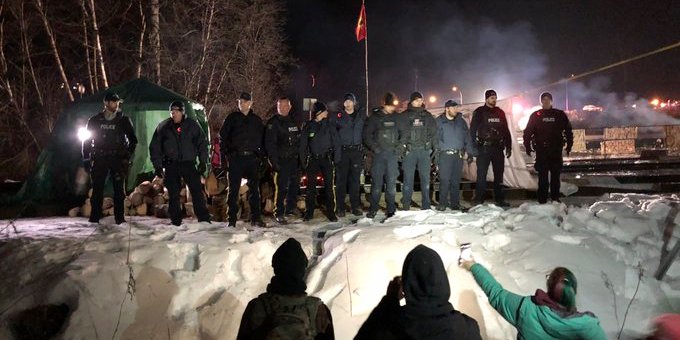
RCMP move in and arrest Gitxsan people blocking CN tracks near
New
Hazelton in solidarity with Wet'suwet'en land defenders, February 24,
2020.
We are outraged by the Royal Canadian Mounted
Police (RCMP)
decision to arrest our long-time colleague, journalist and
filmmaker Melissa Cox, on the evening of February 24, 2020, at
New Hazelton on unceded Gitxsan territory.
Ms. Cox has been documenting Wet'suwet'en land
defenders'
efforts to resist Coastal GasLink's pipeline project for nearly
two months, filming for a documentary by the working title YINT'AH of which we
are the producers, and filing video reports
with other media outlets.
On February 24, she was filming as Gitxsan
hereditary chiefs
and supporters blocked the tracks at New Hazelton in solidarity
with the Wet'suwet'en and the Mohawks of Tyendinaga. She was
wearing a press credential from the National Press Photographers
Association.
Ms. Cox had just filmed as the RCMP arrested
Gitxsan
hereditary Chief Spookw. In spite of the fact that she was
clearly marked press, RCMP officers chose to arrest her, thus
making it impossible for her to carry out her work documenting
and bearing witness to the events underway.
Moreover, RCMP used an undue amount of force,
twisting Ms.
Cox's left arm in a painful manner as multiple officers pried her
camera out of her other hand, which ripped her headphones off.
They tossed her camera on the ground, and later appeared to be
manipulating the camera and pressing various buttons. A legal
observer asked repeatedly if she could pick up the camera to
protect it, requests ignored by the RCMP.
RCMP cuffed Ms. Cox with her hands behind her back
which
aggravated a pre-existing injury in her left shoulder. She
repeatedly stated that her injury was being aggravated and
requested that they change the position of the cuffs, which they
refused to do as they read her rights and searched her. By this
point, she was in tears from the pain.
Having been arrested herself, Ms. Cox was unable
to document
the arrest of 71-year-old Head House Chief and Matriarch
Gwininitxw (Yvonne Lattie), and other arrests made subsequently
by the RCMP.
Ms. Cox was held by the RCMP approximately seven
hours
and
released on restrictive conditions including that she "keep 10
meters off any CN property or work-site." Abiding by that
condition would restrict her ability to cover further rail
blockades. Moreover, she is required to appear in court on April
24, 2020 to face further prosecution.
We are deeply disturbed by the RCMP's arrest of
Ms. Cox, which
is part of a pattern of detentions, arrests and efforts to limit
the access and mobility of journalists that we have witnessed
across the country over the past month. Freedom of the press and
other media of communication is a fundamental freedom protected
by Canada's Charter of
Rights and Freedoms. In March 2019, a
landmark decision by a Newfoundland and Labrador court known as
the Justin Brake case reaffirmed that even when an injunction
order has been issued, special considerations apply to
journalists working in good faith and reporting on matters in the
public interest. The decision states that: "To achieve the goal
of reconciliation, better understanding of aboriginal peoples and
aboriginal issues is needed. This places a heightened importance
on ensuring that independently-reported information about
aboriginal issues, including aboriginal protests, is available to
the extent possible."
Security forces arresting journalists and
filmmakers causes a
chilling effect on freedom of speech and interferes with the
public's right to be informed, which are cornerstones of
democracy. Transparency and communication in a fair, accurate,
nuanced and honest way is also the only basis on which right
relations between people and between nations can ever be
achieved. This has been Ms. Cox's stance as a documentary
filmmaker, and we wholeheartedly stand with her. We expect that
no charges will be laid, and that as matters of public interest
related to policing of Indigenous communities continue to unfold
throughout Canada, journalists and filmmakers will be able to
report and film unimpeded.
Franklin
López
Michael Toledano
Sam Vinal
Andréa
Schmidt
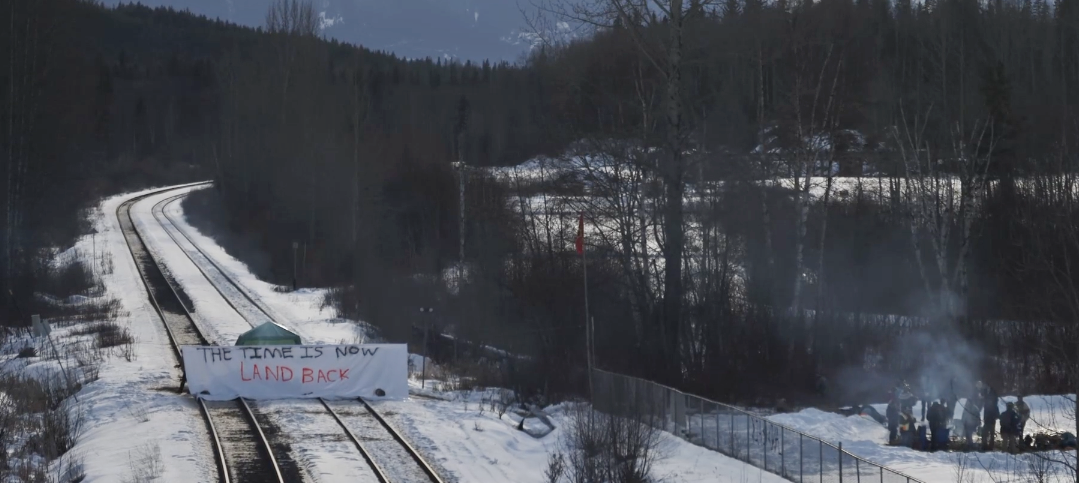

- Peggy Morton -
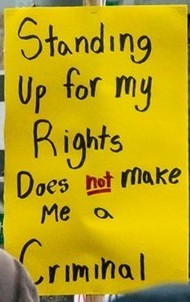 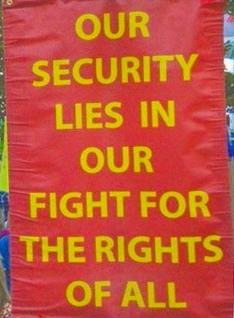 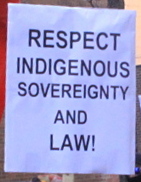
The Alberta legislature began its spring session
on February
25 with the
introduction of Bill 1, the Critical Infrastructure Defence
Act, immediately following the Speech from the Throne.
Albertans and Indigenous peoples are affirming their
rights and demanding an end to the brutal anti-social offensive
and destruction of the social fabric of society. Instead of addressing
their concerns, the
first act of the Kenney government was to
escalate the offensive against all who are defending rights and
laying their claims and to call on all
the other provinces to adopt such legislation.
The Kenney government stated that the aim of the
bill is "to
protect essential infrastructure from damage or interference
caused by blockades, protests or similar activities, which can
cause significant public safety, social, economic and
environmental consequences." Bill 1 applies to public as well as
private infrastructure.
Bill 1 provides penalties of up to $10,000 for a
first
offence, up to $25,000 for subsequent offensives, with possible prison
time of up to six months, and up to $200,000 for "corporations
that help or direct trespassers." Each day that a "contravention"
exists constitutes a new offence. Police can make arrests at
their discretion without a warrant or injunction.
The bill provides a long list of "essential
infrastructure,"
including pipelines, oil and gas production and refinery sites,
utilities, highways, railways, telecommunications, mines,
agricultural sites, and the land on which infrastructure is
located, plus "a building, structure, device or other thing
prescribed by the regulations." In short -- "essential infrastructure"
is anything the
government declares it to be. Regulations are enacted under the
prerogative or police powers of the executive and can be changed
at any time by executive decision.
 The Kenney government claims to
be defending law
and order
against anarchy and chaos. "Over the last number of weeks, we've
seen growing lawlessness across the country, pushing our railway
lines to grind to a halt," Alberta Minister of Justice Doug
Schweitzer said. "This is simply unacceptable. This is a mockery
of our democratically founded country. So we're now taking
decisive action to respond to this." The Kenney government claims to
be defending law
and order
against anarchy and chaos. "Over the last number of weeks, we've
seen growing lawlessness across the country, pushing our railway
lines to grind to a halt," Alberta Minister of Justice Doug
Schweitzer said. "This is simply unacceptable. This is a mockery
of our democratically founded country. So we're now taking
decisive action to respond to this."
Kenney's rage, hatred, vitriol, and spirit of
revenge against
those who defend their rights reveals in all its ugliness the
face of the old society where "anything goes" to preserve the
rule of the rich and serve the mainly foreign monopolies who have
seized control of all decision-making. Unable to solve any
problem facing the people, their answer is to lash out, defaming
individuals and criminalizing ideology and acts of
resistance.
This "rule of law" negates the reality that
Indigenous peoples
in Alberta are not a conquered people and their land rights have
never been extinguished. Most of the traditional Indigenous
territories in Alberta are covered by treaty in which the
Indigenous peoples agreed to share the land. They are not land
surrender treaties, and there is no rule of law when treaty and
inherent rights are negated.
Bill 1 is also directed against workers who defend
their
rights through strike action, and against the resistance to the
anti-social offensive and the united stand and No! of the public
sector workers to the assault on their wages, conditions of work
and security in retirement. It is intended to target workers
defending their picket lines, which are already confined by
injunctions and other means intended to make them ineffective.
Bill 1 adds to the arsenal used to impose huge fines on unions
which uphold the right of workers to decide the wages and working
conditions acceptable to them.
It does not stop there. Kenney's contempt for
international
rule of law was evident in the Throne Speech when he declared,
"The Government of Alberta is prepared to do whatever it takes to
develop our resources responsibly and get them to global markets
to compete with and displace energy from some of the world's
worst regimes." "Whatever it takes" means support for regime
change, murderous sanctions, aggression and war, used in part to
"displace" oil from countries such as Venezuela, Iran and Iraq. It
means an Alberta economy tied to the U.S. war machine and attempts to
criminalize all opposition.
 It goes without
saying that Bill 1 will be
challenged on the
basis that it is illegal and a violation of the Charter
or
civil right to freedom of expression and freedom of assembly. It
will also certainly be challenged by the people in action to
defend their human rights as well as their civil rights. When
laws do not recognize the rights which belong to people by virtue
of their being, including the sovereign rights of Indigenous
peoples and the rights of workers as the producers of all social
value, a serious problem arises. This refusal creates a conflict
between the authority and the modern conditions. That is a big
problem facing the people and society, which needs to be
addressed and resolved. It is not a problem which can be sorted
out by using force and violence in the name of "law and
order." It goes without
saying that Bill 1 will be
challenged on the
basis that it is illegal and a violation of the Charter
or
civil right to freedom of expression and freedom of assembly. It
will also certainly be challenged by the people in action to
defend their human rights as well as their civil rights. When
laws do not recognize the rights which belong to people by virtue
of their being, including the sovereign rights of Indigenous
peoples and the rights of workers as the producers of all social
value, a serious problem arises. This refusal creates a conflict
between the authority and the modern conditions. That is a big
problem facing the people and society, which needs to be
addressed and resolved. It is not a problem which can be sorted
out by using force and violence in the name of "law and
order."
Athabasca Chipewyan First Nation Chief Allan Adam
noted,
"Looking at all the issues and concerns that First Nations people
have regardless of where they're living, major cities or
reserves, they're all living the same conditions. Nothing has
improved so you're going to probably see more demonstrations in
that regards.
"You've got to remember that Jason Kenney was part
of the
Harper government in Ottawa which was pretty much run like a
police state; so if he's following the same footsteps in that
regard, I guess we're going to have a police-state province,"
said Adam.
Adam's comments reflect the reality that people
will not
accept a rule of law in contempt of a modern understanding of the
purpose of law to serve the cause of justice. No matter how hard
Kenney tries to sow division and rancour, incite vigilantism,
tear up agreements and impose the will of the oligarchs through
the use of police powers, it is not going to stop the forward
march of Albertans and the Indigenous peoples. The need for
democratic renewal to provide the working people with a say in
governance and for nation-to-nation relations between Canada and
the Indigenous peoples has never been more urgent. Bill 1 must be
repealed!
Our Security Lies in the
Fight for the Rights of All!

Oppose Extraterritorial
Application of U.S. Sanctions Against Cuba!
- Canadian Network on Cuba -
 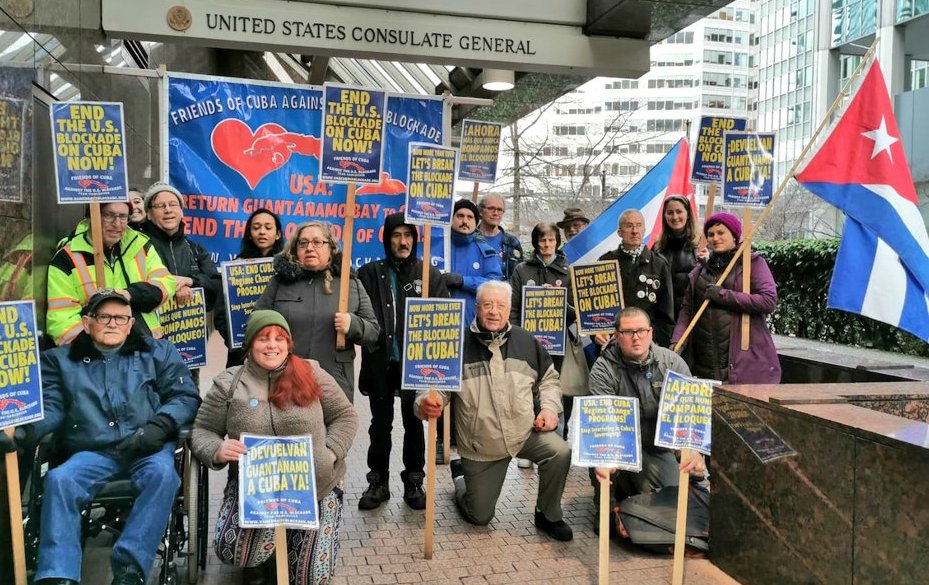
Vancouver monthly pickets against U.S. blockade of Cuba, January 17,
2020, (left) and
February 17, 2020.
Re: Western
Union and U.S. Economic Sanctions Against Cuba
I am writing to you on behalf of the Canadian
Network on Cuba
(CNC), which represents Canada-Cuba friendship and solidarity
organizations across Canada, ranging from Vancouver to Halifax
and with over 50,000 in membership. One of the CNC's principal
objectives is advocating that Canadian foreign policy regarding
Cuba remains based on equality and respect for sovereignty and
the right of self-determination.
Consequently, the CNC is deeply concerned by the
decision of
Western Union Financial Services (Canada), Inc. to end the
transfer of funds from Canada to Cuba. As Elizabeth Hill, a
Toronto resident, was informed on February 21 at the Western
Union outlet on St. Clair Avenue, "Western Union employees got a
memo today saying they can no longer transfer funds to Cuba. They
can only send funds to relatives of U.S. people."
 This decision
will not only cause significant damage to
people-to-people contacts and Canada-Cuba relations but is also a
violation of the sovereignty of Canada by raising U.S. law above
that of Canadian law. This is an unambiguous act of hostility
against Cuba carried out within Canada by Washington. This decision
will not only cause significant damage to
people-to-people contacts and Canada-Cuba relations but is also a
violation of the sovereignty of Canada by raising U.S. law above
that of Canadian law. This is an unambiguous act of hostility
against Cuba carried out within Canada by Washington.
As Ms. Hill observes, "How can this happen in
Canada? I am a
Canadian citizen, and Canada has had good relations with Cuba for
more than 70 years. We do not have a blockade against Cuba as the
United States does. We do not have rules against citizens sending
funds to Cuba."
Does U.S. law supplant Canadian law within Canada?
Is this
decision by Western Union not only a violation of the sovereignty
of Canada but also a contravention of the Canadian Foreign
Extraterritorial Measures Act (FEMA)?
The Government of Canada enacted FEMA in 1984 in
order to
protect Canada against the increasingly extraterritorial nature of
the U.S. economic blockade of Cuba. It was further specifically
amended and strengthened in direct response to the United States' Torricelli Act of
1992 and the Helms-Burton
Act of 1996. In
short, FEMA prohibits Canadian corporations from complying with
the extraterritorial measures of U.S. economic sanctions against
Cuba.
We, therefore, wish to inquire: What concrete
measures will
the Government of Canada implement to oppose the extraterritorial
application of U.S. sanctions against Cuba and enforce the FEMA?
This violation of Canadian sovereignty by Western
Union
Financial Services (Canada), Inc. illustrates that Washington not
only wages an economic blockade against Cuba but also a
diplomatic and political blockade. For 28 consecutive years, the
General Assembly of the United Nations has rejected and condemned
these economic sanctions -- an economic blockade -- imposed on Cuba
by the United States. Washington's policy, with its extraterritorial
character, is a flagrant violation of the UN Charter and
customary international law. In 2019, as in previous years, the
global community overwhelmingly stood with Cuba, voting 187-3
against Washington. Canada was once again counted in the vast
ranks of the world's nations resoundingly rejecting the coercive,
unilateral and extraterritorial U.S. policy.
The CNC calls on the Government of Canada to
uphold Canadian sovereignty and reject this or any other effort to
implement in Canada the internationally condemned and illegal
U.S. economic blockade of Cuba.
In closing, I wish to thank you in advance for
your
consideration of the issues raised and answering the questions
posed.
If you have any queries, please do not hesitate to
contact
me.
Respectfully,
Isaac Saney,
Co-Chair and National Spokesperson
Canadian
Network on Cuba
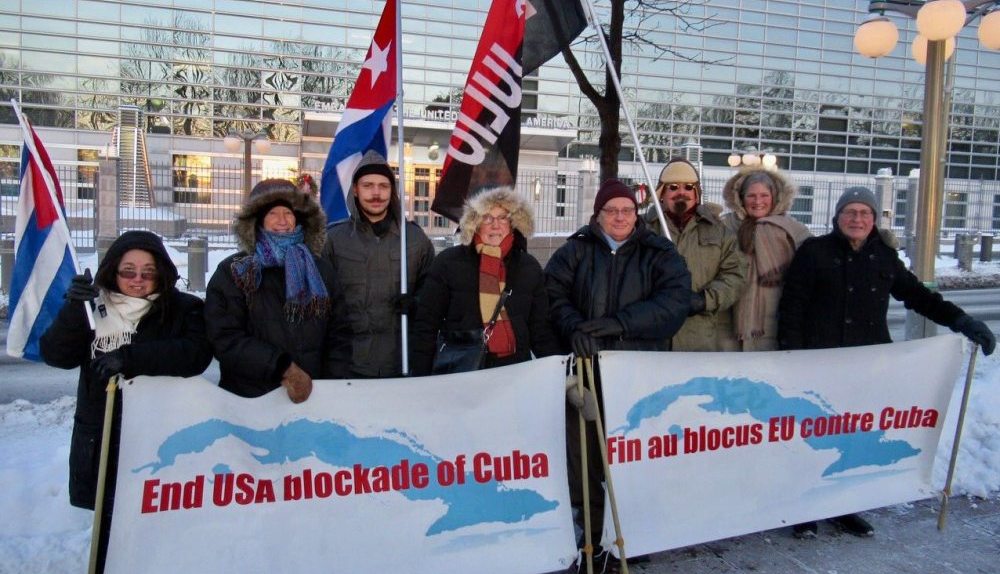
Monthly picket against U.S. blockade of Cuba, Ottawa, January 17, 2020.

56th Annual Munich Security
Conference
- Nick Lin -
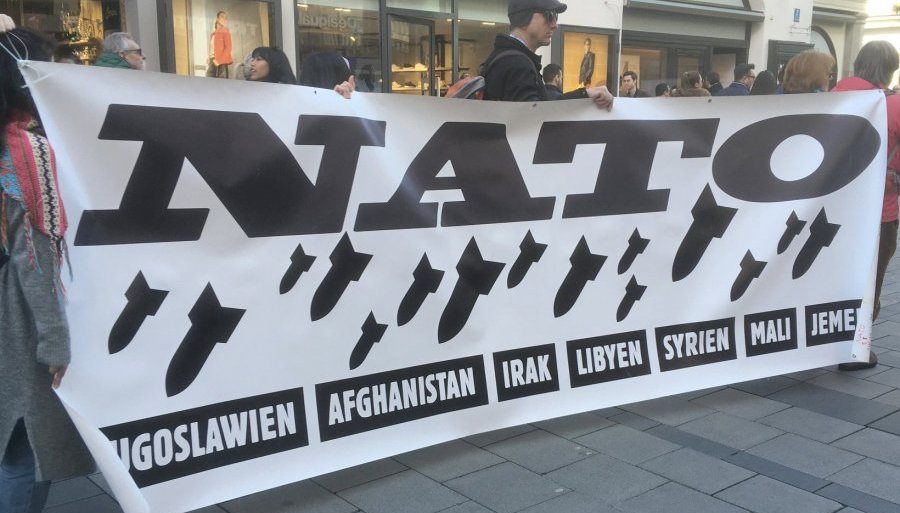
At least 4,000 people from Germany, along with
others
from across
Europe, converged in Munich on February 15 to vigorously oppose
the 56th annual Munich Security Conference (MSC), held from
February 14 to 16. The protest made it clear that NATO warmongers
are not welcome and that the people of Germany are doing their
duty to uphold the historic verdict of World War II, "Never
Again!"
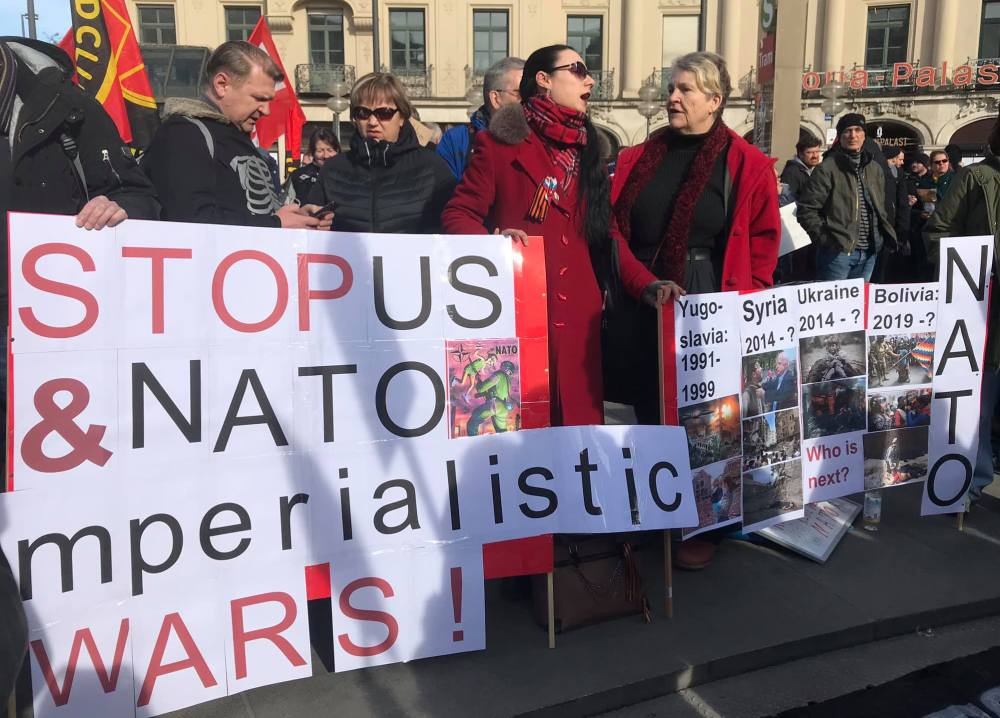 The MSC is a war
conference in the same vein as the Halifax
International Security Forum. It is based on an imperialist
definition of "security" to justify NATO aggression and war against
countries that will not submit to imperialist economic and
political dictate. This year's MSC brought together some 500
warmongers and others said to be from the "fields of politics,
business, academia, and civil society [to] discuss current crises
and future security challenges," all of whom the MSC refers to as
"decision-makers." Thirty-five heads of state or government, as
well as over 100 foreign and defence ministers were expected at
the conference. The MSC is a war
conference in the same vein as the Halifax
International Security Forum. It is based on an imperialist
definition of "security" to justify NATO aggression and war against
countries that will not submit to imperialist economic and
political dictate. This year's MSC brought together some 500
warmongers and others said to be from the "fields of politics,
business, academia, and civil society [to] discuss current crises
and future security challenges," all of whom the MSC refers to as
"decision-makers." Thirty-five heads of state or government, as
well as over 100 foreign and defence ministers were expected at
the conference.
This year's MSC was preoccupied with a phenomenon
the
organizers refer to as "Westlessness." Namely, the political
crises in NATO member countries and what they perceive as the
loss of influence of so-called Western values. Life has shown
that liberal democracy's "universal Western values" of a
market economy and representative democracy -- said to be the
endpoint of human social and political development -- cannot
provide solutions to the problems the people are facing.
Consequently, the people are rejecting the anachronistic liberal
democratic institutions, based on their own experience that these
are the very means by which they are deprived of a say in
the direction of the society, including on the key questions of
war and peace.
Among those attending the MSC was Prime Minister
Justin
Trudeau, who delivered remarks to the conference on February 14.
Much of the speech was an attempt to wrangle support for Canada to have
a seat
on the UN Security Council, and suggested that Canada has a vital
role as a middle power in the international order. He also espoused the
need to prop up neo-liberalism -- called liberal democracy, and
maintain the
status quo in international relations, and for a rules-based order. His
speech
presented the scenario that working people are to blame for
electing "populist" governments, covering up that part of the crisis
of liberal democracy is that the people are blocked from having a
say, while establishment political parties do their utmost to sow
divisions among the people. Those countries that are
affirming their right to be and to set their own course politically
and economically, including the rejection of U.S. hegemony in
politics and trade, he referred to in saying the "global
balance of power is shifting, with new powers rapidly rising and
others becoming more assertive in their regions." He specifically
singled out Venezuela, presenting Canada's dirty attempt to
foment the regime change of a democratically elected government via
the Lima Group -- a clear breach of international law -- as
defending democracy.
 This
clash
between authority and conditions was on full
display at the MSC: so-called leaders attending to decide
who will be made the target of warmongering by NATO countries enforcing
imperialist dictate under the mantra "Western values"
versus those demonstrating outside to uphold the interests of the
oppressed peoples of the world and defend the cause of
international peace. This
clash
between authority and conditions was on full
display at the MSC: so-called leaders attending to decide
who will be made the target of warmongering by NATO countries enforcing
imperialist dictate under the mantra "Western values"
versus those demonstrating outside to uphold the interests of the
oppressed peoples of the world and defend the cause of
international peace.
In the call for the mass demonstration at this
year's
conference, anti-war activists pointed out the definition of
security espoused by the Munich war conference is "not -- as
conference leader Wolfgang Ischinger says -- the 'peaceful
resolution of conflicts;' it is not for the safety of the people
here, nor the safety of people elsewhere in the world, but for
the supremacy of the West with its capitalist economic system
based on the exploitation of human beings and nature."
The activists pointed out how this economic
system, and the
military aggression used to enforce it, is responsible for the
putsch-promoting and sanctions policies against Cuba, Venezuela and
Bolivia, for example, and the trade and economic confrontations with
China and Russia, which threaten to turn into hot wars. They stated
that, "The prevailing policy of regime change and forcible access to
resources means destabilization, sanctions, economic boycott, civil war
and war."
While Prime Minister Trudeau and others claim that
Canada and
other "Western countries" stand for rules-based governance, the
anti-war activists pointed out that under the auspices of these
countries, "[International] law is systematically broken; recent
examples are the hidden genocide in Yemen by the Saudi war
coalition, the ongoing war for the destruction of Syria and
Turkey's attack on the Kurds in northeast Syria." In other words,
the claim that "Western" countries have the moral high ground to
dictate and intervene in the affairs of others is soundly
dismissed.
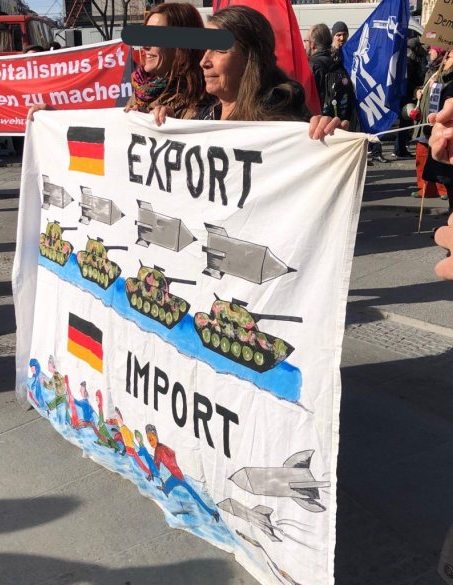 The activists
raised the alarm about Germany's increasing
militarization. They explained that since 1992, the Defence Policy
Guidelines of the German government define the "maintenance of
global free trade and unrestricted access to markets and raw
materials around the world" as "vital German security interests."
The German government has pledged to double its 2018 level of
military spending by 2031. Germany and France have the most
expensive weapons programs in Europe, and the massive rearmament
of the German army can only be for purposes of aggressive
intervention, not defence, and is part of the overall
militarization of the European Union, the activists noted. This,
they pointed out, is a continuation of the rearmament of Germany
when, 20 years ago, a coalition government of the Social
Democratic Party and Green Party authorized Germany's
participation in NATO's illegal invasion of Yugoslavia. The activists
raised the alarm about Germany's increasing
militarization. They explained that since 1992, the Defence Policy
Guidelines of the German government define the "maintenance of
global free trade and unrestricted access to markets and raw
materials around the world" as "vital German security interests."
The German government has pledged to double its 2018 level of
military spending by 2031. Germany and France have the most
expensive weapons programs in Europe, and the massive rearmament
of the German army can only be for purposes of aggressive
intervention, not defence, and is part of the overall
militarization of the European Union, the activists noted. This,
they pointed out, is a continuation of the rearmament of Germany
when, 20 years ago, a coalition government of the Social
Democratic Party and Green Party authorized Germany's
participation in NATO's illegal invasion of Yugoslavia.
As the example of Yugoslavia shows, the wars waged
by NATO
countries to enforce power and economic interests cost countless
lives, devastate entire regions of the world, rob future
generations of their livelihood and drive people en masse to flee,
the
anti-war activists pointed out. Yet, fully aware of these
consequences, "the representatives of the Western 'community of
values' continue to escalate."
The latest MSC underscores
that
so-called Western values and the countries whose governments
espouse them through threat of force and the use of force by NATO
and other aggressive means, face an irreversible crisis. What is
key is that the working people of the world rise to the challenge
of the times, continue to speak in their own name, actively
oppose NATO warmongering and organize and empower themselves so
that the crises facing humanity are resolved in favour of the
people and the interests of international peace.
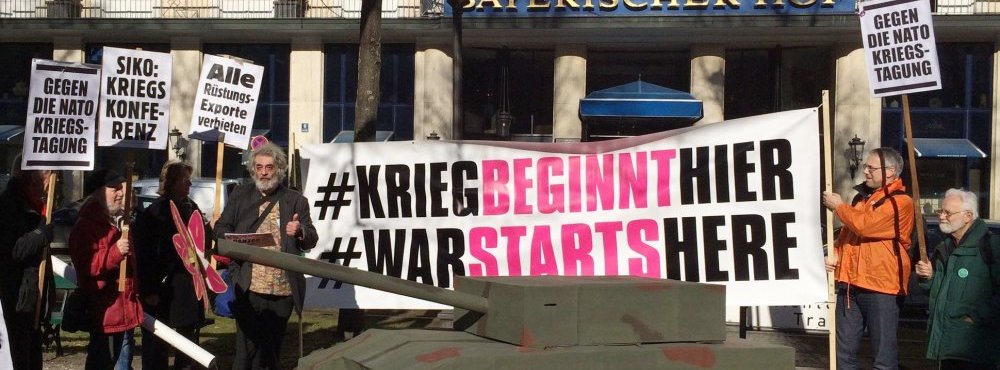
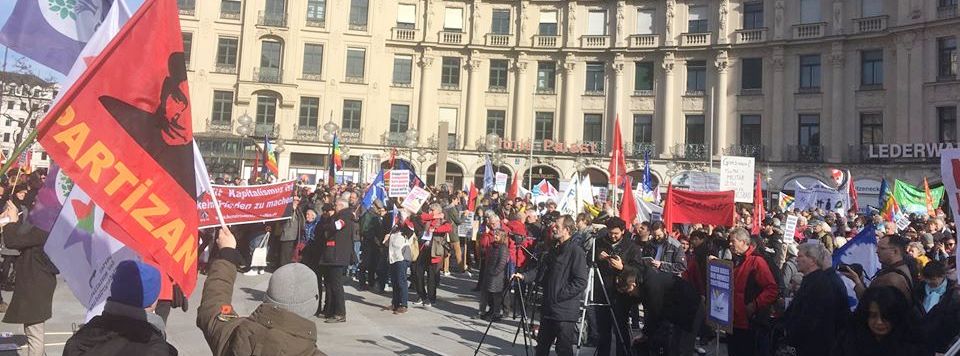

 



U.S.-Philippines Visiting
Forces Agreement
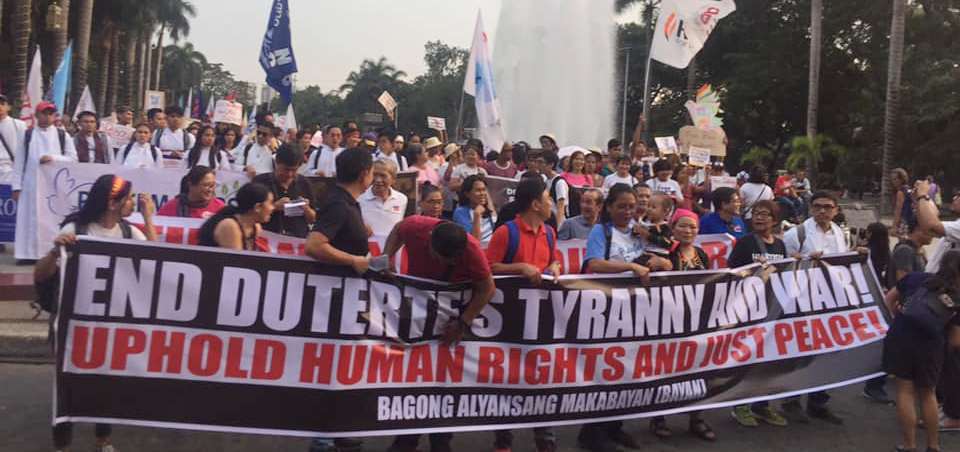
March in Manila, Philippines, on Human Rights Day, December 10, 2019,
part of ongoing fight
of the people against the brutal Duterte regime.
On February 11, President Rodrigo Duterte of the
Philippines informed the U.S. government that he is terminating
the Visiting Forces Agreement signed between the
Philippines and the U.S. in 1999. Media reports speculate that he
took this action in response to the U.S. government cancelling
the travel visa for Senator Ronald de la Rosa, one of Duterte's
cronies and the former head of the Philippine National Police, who
is responsible for executing Duterte's so-called "war on drugs,"
under which an estimated 30,000 people have been killed and a
reign of terror perpetrated targeting progressive people and
their mass organizations.
Philippine revolutionary and patriotic forces have
since day one demanded the abrogation of the Visiting Forces Agreement
and
other unequal
treaties, and the withdrawal of all foreign troops from
Philippine territory.
The National Democratic Front of the Philippines
(NDFP) notes
that the Visiting Forces Agreement is an affront to the sovereignty of
the Philippines.
"These unequal treaties allow U.S. military forces to control the
security and intelligence apparatuses of the Manila government,
to maintain secret facilities and stockpile weapons on Philippine
territory, as well as to commit crimes against the Filipino
people, including rape and murder," the NDFP underscores.
The Visiting Forces Agreement is part of the
U.S.-Philippines Mutual
Defence Treaty
of 1951 and the 2014 Enhanced Defence Cooperation Agreement which
enables the U.S. to carry out joint military exercises with the
Philippines military and assist the Philippine state in
repression of the people and the national liberation struggle
being waged by the New People's Army under the leadership of the
Communist Party of the Philippines.
The Visiting Forces Agreement is the
Philippine-U.S. version of a
Status of Forces
Agreement (SOFA) which the U.S. has concluded with more than 100
countries around the world. Such agreements are instruments of
U.S. occupation and impunity, and enable the U.S. to place troops and
weapons in
countries around the world, such as in south Korea where it has
THAAD missiles and other weapons, 28,500 U.S. troops and military bases
to
threaten the Democratic People's Republic of Korea and
China.
Jose Maria Sison, the Chief Consultant of the NDFP
notes that it will take six
months before the withdrawal from the Visiting Forces Agreement takes
effect and many
things can happen between now and then. He says that
there are many in the leadership of the Philippines Armed Forces
who were trained in the U.S. and who are paid agents of the CIA
and U.S. secret service who have a vested interest in maintaining
the Visiting Forces Agreement with the U.S. and who will be told to
oppose Duterte
because the agreement is vital to U.S. hegemonic interests in the
Philippines, East and South East Asia, and the world.
The fighting people of the Philippines have their
own long
experience with the U.S. imperialists. In the civil war that they
are waging against the Philippine state -- which defends the private
interests of the rich local capitalists and landlords and gives carte
blanche access
to foreign
monopolies, including
Canadian mining companies and others to rape and pillage the
people and resources of the Philippines -- they have kept the
initiative in their hands. They are waging armed struggle with
the
New People's Army under the seasoned leadership of the Communist Party
of the Philippines to rid their islands of the domination of
U.S.
imperialism and its military and all foreign interests that exploit and
oppress their peoples. They will not be diverted by the shenanigans of
Duterte who is caught in the web of U.S. and other big power
manoeuvring for geopolitical control of the region for their own narrow
interests.

Communist Party of Vietnam's
90th Anniversary

Cultural performance in Hanoi, February 1, 2020, on the occasion of the
90th anniversary of the founding of the Communist Party of Vietnam.
On February 3, the people of Vietnam marked the
90th anniversary of the Communist Party of Vietnam (CPV), founded by
their legendary leader Ho Chi Minh.

General Secretary of the CPV Central
Committee and President of Vietnam Nguyen Phu Trong speaks in Hanoi,
February 3, 2020.
|
At a ceremony in Hanoi, General Secretary of the
CPV Central Committee and President Nguyen Phu Trong stated that the
CPV is the only political organization in Vietnam with the quality,
brainpower, experience, prestige and capacity to lead the country to
overcome all difficulties and challenges, and drive the national
revolutionary cause from one victory to the next.
Those in attendance included Prime Minister Nguyen
Xuan Phuc, National Assembly Chairwoman Nguyen Thi Kim Ngan, and many
other incumbent and former leaders of the Party, State and Vietnam
Fatherland Front, and veteran revolutionaries.
President Nguyen looked back over the
process of the
establishment, training, devotion and development of the CPV and
highlighted the historical significance of its founding on February 3,
1930.
"The Vietnamese revolution's diverse and vivid
reality over the past 90 years has demonstrated that the Party's sound
and clear-sighted leadership is a leading decisive factor to ensure all
revolutionary victories and make many exploits in Vietnam," he said.
Mentioning Vietnam's achievements during nearly 35
years of reform, President Nguyen said Vietnam has emerged as a
developing country
whose people have reached middle-income status. Its politics and
society have been stabilized; national defence-security, independence
and sovereignty have been firmly maintained, and its position and
prestige in the international arena have been enhanced.
The country has to date joined most international
organizations and become an active and responsible member of the
international community, he stressed, noting that Vietnam was recently
elected for the second time as a non-permanent member of the United
Nations Security Council in a landslide vote.
 On the front
of party-building, President Nguyen emphasized the need to carry
forward Vietnam's
beautiful traditions, while maintaining and building on the Party's
revolutionary nature and its pioneering role. He said that the Party
must be principled and strong when it comes to its politics, ideology,
morality, apparatus and personnel. It must revamp its leadership
methods, strengthen the close-knit relations between the Party and
people, prevent and counteract degradation, and enhance the Party's
ability to lead and fight the battles to come. On the front
of party-building, President Nguyen emphasized the need to carry
forward Vietnam's
beautiful traditions, while maintaining and building on the Party's
revolutionary nature and its pioneering role. He said that the Party
must be principled and strong when it comes to its politics, ideology,
morality, apparatus and personnel. It must revamp its leadership
methods, strengthen the close-knit relations between the Party and
people, prevent and counteract degradation, and enhance the Party's
ability to lead and fight the battles to come.
President Nguyen also pointed out major
tasks in 2020 -- the
final year of the 12th National Party Congress -- such as completing
all socio-economic development targets, reinforcing macro-economic
stability, accelerating the implementation of strategic breakthroughs,
restructuring the national economy in tandem with reforming the growth
model, ensuring social security and welfare and improving people's
living standards.
He also called for greater efforts to firmly
maintain national independence and sovereignty, as well as a
peaceful and stable environment to serve national development and
promote external relations.
He said, attention must be paid to the successful
organization of Party congresses at all levels, in working towards the
13th National Party Congress, as well as to the implementation of
resolutions on party-building adopted at the fourth plenums of the 11th
and 12th Party Central Committees, and the Politburo's Directive No. 5
on promoting the study and implementation of President Ho Chi Minh's
theory and practice, to strengthen party-building and rectification
work.
The CPV received congratulations from political
leaders and parties from around the world.
Educating the Younger Generations About the
Party
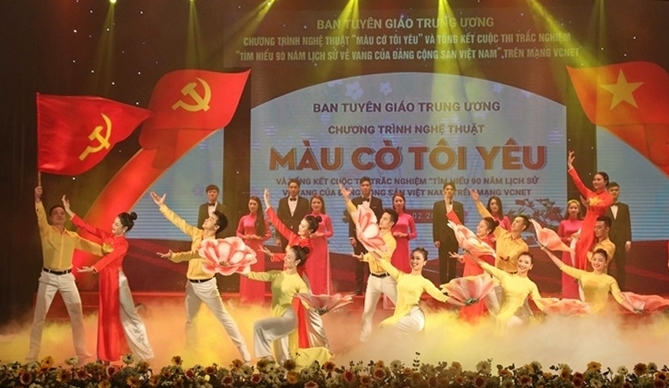 Cultural performance "Mau co toi yeu" in Hanoi,
February 1, 2020. Cultural performance "Mau co toi yeu" in Hanoi,
February 1, 2020.
A contest to educate Vietnamese youth at home and
in the diaspora about Vietnam and the CPV culminated with an awards
ceremony during an art performance titled "Mau co toi yeu" (The flag
colour I love) on February 1 in Hanoi.
Organized on the social network VCNET by the Party
Central Committee Commission for Popularization and Education, the
contest aimed to celebrate the founding of the CPV and the upcoming
13th National Party Congress. Eighteen weeks of competition began
August 22, 2019, and was open to all Vietnamese teenagers and
youth, 9-30 years of age, at home and abroad. The 138
questions were related to the history of the CPV, highlighting the
historic moments which were connected to the country's important
achievements under the leadership of the CPV and President Ho Chi Minh,
especially in earlier struggles for national
liberation, national construction and protection as well as
the current renewal process.
The organizing committee awarded 198 prizes,
including 18 first prizes, 36 second prizes, 54 third prizes and 90
consolation prizes.
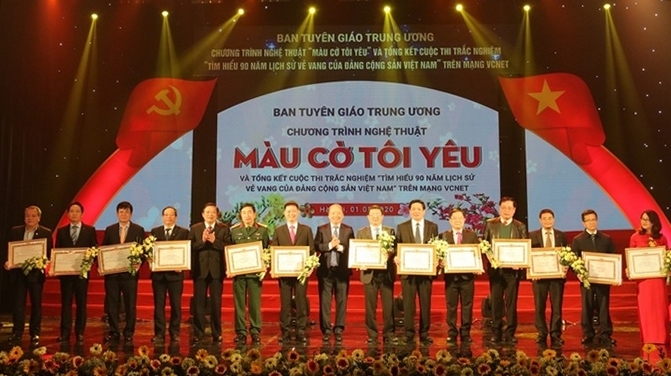
Book Launch
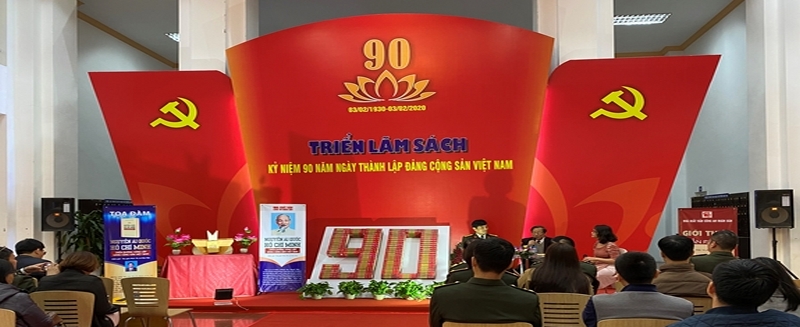
The book Nguyen
Ai Quoc -- Ho Chi Minh on the Way of Founding the Communist Party of
Vietnam by Associate Professor Dr. Le Van Yen, was
launched on February 6 by the People's Public Security Publishing
House. It has three chapters: Ho Chi Minh -- From a Patriotic Person to
a Communist Soldier; Ho Chi Minh's Activities and Contributions to
International Communist Movements; and Ho Chi Minh -- the Founder of
the CPV.
Release of Anniversary Stamp
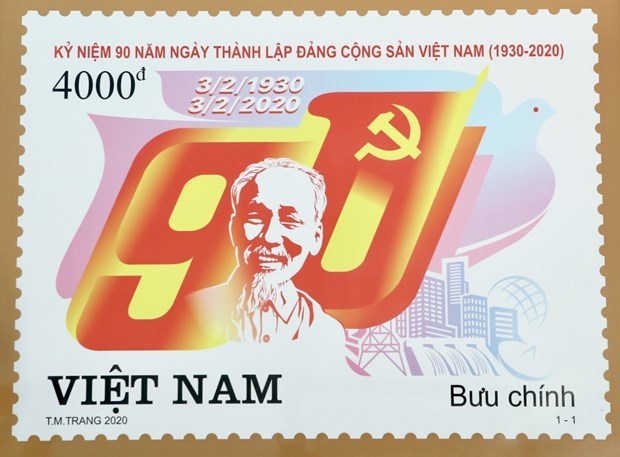 A stamp
celebrating the CPV's anniversary was
revealed to the public on January 31. Designed by painter To Minh Trang
of the Vietnam Post Corporation, it features the number 90 on the
Party's flag with a portrait of the late President Ho Chi Minh, the
founder of the Party. It includes an image of a dove representing peace
and national independence. Also featured are images that represent the
country's achievements in the economy, industrialization and
modernization under the Party's leadership. A stamp
celebrating the CPV's anniversary was
revealed to the public on January 31. Designed by painter To Minh Trang
of the Vietnam Post Corporation, it features the number 90 on the
Party's flag with a portrait of the late President Ho Chi Minh, the
founder of the Party. It includes an image of a dove representing peace
and national independence. Also featured are images that represent the
country's achievements in the economy, industrialization and
modernization under the Party's leadership.
Celebrations in Ho Chi Minh City

A program of artistic performances and a
photo exhibition were organized in Ho Chi Minh City on the occasion of
the CPV's anniversary.
The art program featured 200 artists performing
works celebrating the achievements of the Party and Ho Chi Minh, as
well as glorious feats of the Vietnamese army and people in the
struggle for national liberation, national unity, and the construction
and defence of the country.
The photo exhibition about the leadership of CPV,
located on Nguyen Hue Street, was comprised of 300
black-and-white and colour photos featuring all of the important
struggles taken up under the Party’s leadership over the past
nine decades, and the city's revolutionary tradition.
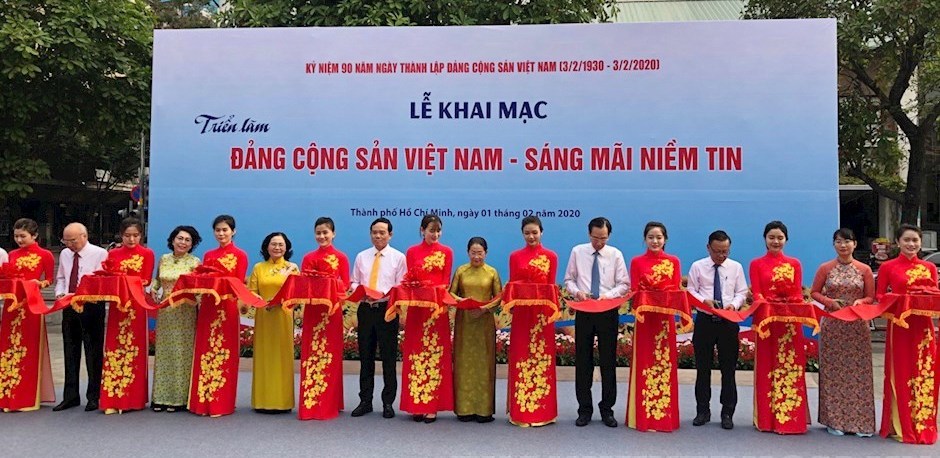


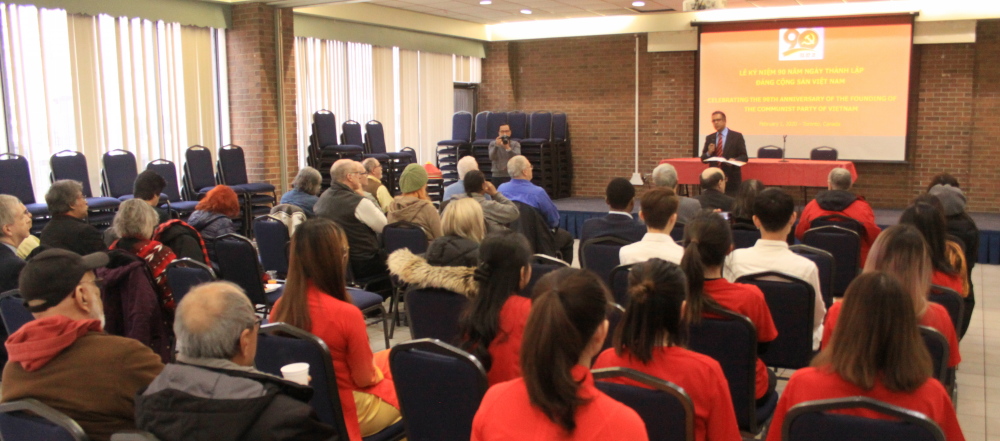
On February 1, a commemorative meeting was held
at the Steelworkers Hall in Toronto to mark the 90th anniversary of the
founding of the Communist Party of Vietnam (CPV) by the legendary
leader of the Vietnamese people, Ho Chi Minh. The meeting was organized
by the Canada-Vietnam Friendship Society, whose main aim is to
strengthen and promote fraternal ties between the Vietnamese and
Canadian peoples.
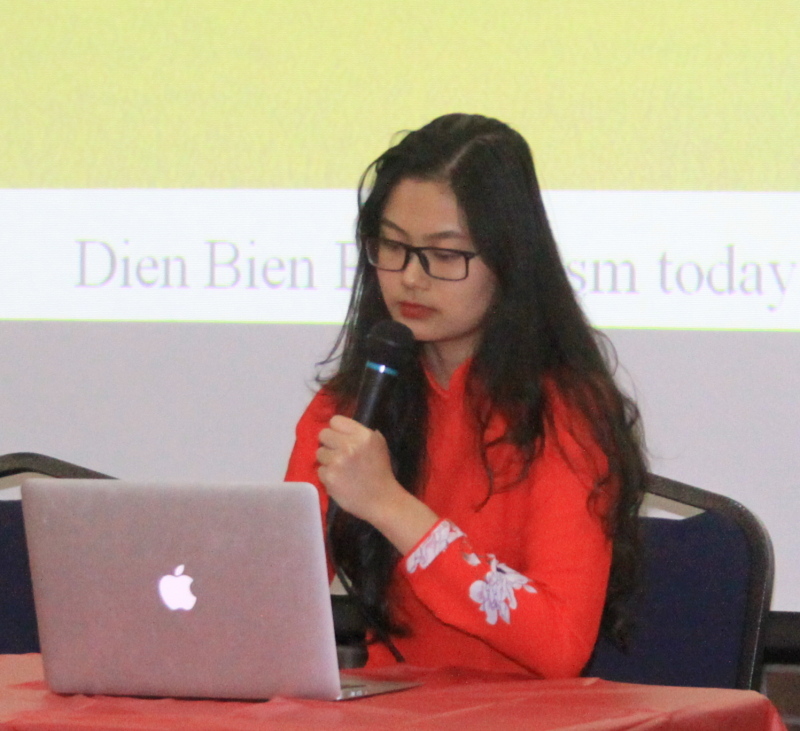 The first speaker
was Ms. Thanh Trinh, a Vietnamese youth who is studying at York
University. In her presentation, Ms. Thanh highlighted the work of
the CPV in mobilizing Vietnamese youth in all aspects of
nation-building. She noted that youth were front and centre in
Vietnam's long struggle for independence and that this legacy has been
brought forward today with youth in Vietnam being trained by the CPV in
the Communist Youth League and other organizations to take their place
as leaders of Vietnamese society, by contributing their individual and
collective skills and talents to the nation. She pointed out that there
are many Vietnamese youth who are students in Canadian post-secondary
institutions who will return to Vietnam and contribute to building
their country. The first speaker
was Ms. Thanh Trinh, a Vietnamese youth who is studying at York
University. In her presentation, Ms. Thanh highlighted the work of
the CPV in mobilizing Vietnamese youth in all aspects of
nation-building. She noted that youth were front and centre in
Vietnam's long struggle for independence and that this legacy has been
brought forward today with youth in Vietnam being trained by the CPV in
the Communist Youth League and other organizations to take their place
as leaders of Vietnamese society, by contributing their individual and
collective skills and talents to the nation. She pointed out that there
are many Vietnamese youth who are students in Canadian post-secondary
institutions who will return to Vietnam and contribute to building
their country.
Speaking on behalf of the Communist Party of Canada (Marxist-Leninist),
Louis Lang paid tribute to the historic contribution of Ho Chi Minh,
who concluded early on in Vietnam's anti-colonial struggle that without
a communist party guided by Marxist-Leninist theory, the Vietnamese
people would not be able to crown their struggle for independence and
self-determination with victory. He noted that the legacy of Ho Chi
Minh lives today in the CPV as a seasoned revolutionary political party
that is able to renovate and strengthen itself in the face of complex
international developments and to continue to inspire, lead and
organize the people to meet the goals that Vietnam sets for itself. He
noted that the role of the CPV has been decisive in raising the
prestige of Vietnam both in the eyes of its citizens and
internationally.
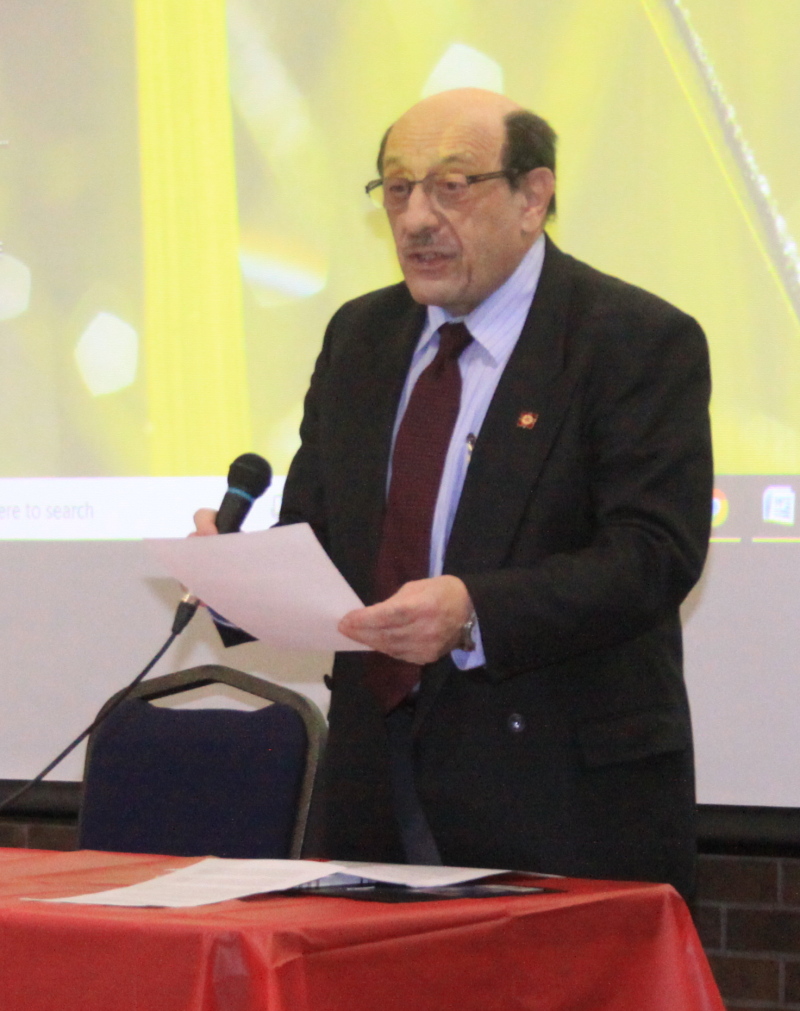 One of the main
things Louis pointed out was that the example of the CPV shows that the
current campaign by the defenders of liberal democracy to caricature
the communist party and communism is to cover up their own crimes, and
that without a communist party guided by Marxist-Leninist theory, the
people are left without the outlook needed to help them find their
bearings in today's complex political world. He concluded by observing
that the CPV has renovated itself so that it is up to the task of
mobilizing the Vietnamese people to strengthen their socialist
democracy and build their independent economy while standing for peace
and fraternal relations with all nations and peoples. He extended
warmest greetings and congratulations to the CPV. One of the main
things Louis pointed out was that the example of the CPV shows that the
current campaign by the defenders of liberal democracy to caricature
the communist party and communism is to cover up their own crimes, and
that without a communist party guided by Marxist-Leninist theory, the
people are left without the outlook needed to help them find their
bearings in today's complex political world. He concluded by observing
that the CPV has renovated itself so that it is up to the task of
mobilizing the Vietnamese people to strengthen their socialist
democracy and build their independent economy while standing for peace
and fraternal relations with all nations and peoples. He extended
warmest greetings and congratulations to the CPV.
Many people who joined in the discussion that followed were
youth at the time of the Vietnam War. They spoke about their experience
of the inspiration provided to the whole world by the valiant
Vietnamese people, who stood together under the leadership of Ho Chi
Minh and the CPV to organize the people to make
the sacrifices necessary to defeat the U.S. imperialists. For example,
Rolf Gerstenberger, former president of United Steelworkers Local 1005
in Hamilton, who was born in the U.S., spoke of resisting the draft,
giving up his U.S. citizenship and moving to Canada, like tens of
thousands of others. He said that as a Canadian, he participated with
the youth of the day to oppose the U.S. war in Vietnam and noted that
at that time the Marxist-Leninists in Canada were in the forefront of
the anti-war movement. He said that to see today what Vietnam has been
able to accomplish under the leadership of the CPV is truly inspiring.
Following a break for refreshments and a cultural
program, the chair of the meeting thanked everyone for coming and
called on them to help build the Canada-Vietnam Friendship Society and
strengthen the relations between the people of Vietnam and Canada in
the interests of peace and friendship.
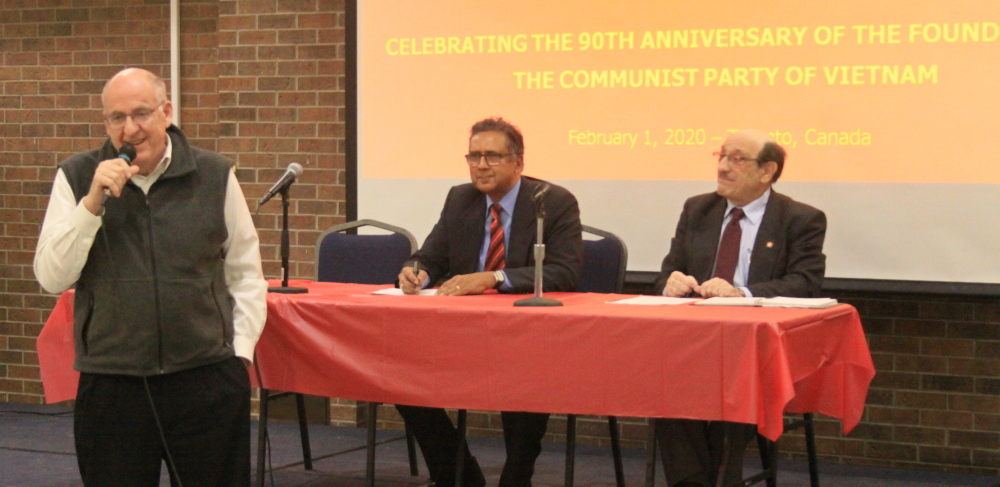
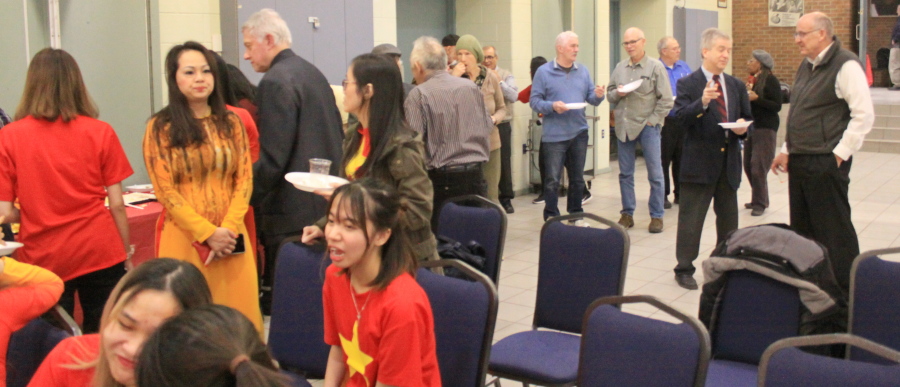
 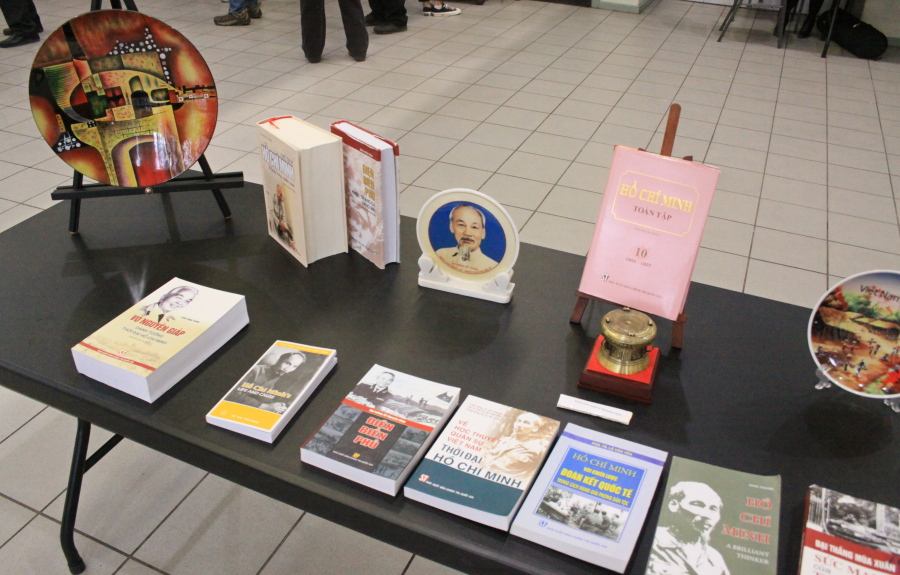
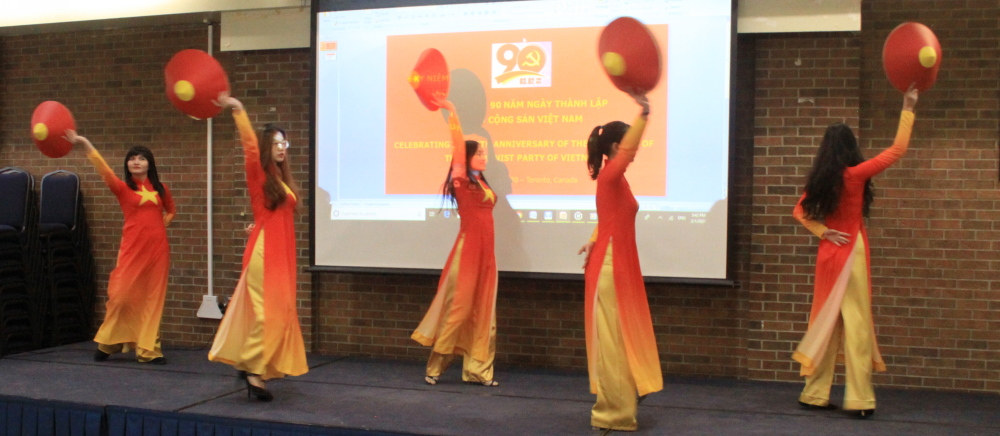


(To access articles
individually click on
the black headline.)
PDF
PREVIOUS
ISSUES | HOME
Website:
www.cpcml.ca
Email: editor@cpcml.ca
|

 On the front
of party-building, President Nguyen emphasized the need to carry
forward Vietnam's
beautiful traditions, while maintaining and building on the Party's
revolutionary nature and its pioneering role. He said that the Party
must be principled and strong when it comes to its politics, ideology,
morality, apparatus and personnel. It must revamp its leadership
methods, strengthen the close-knit relations between the Party and
people, prevent and counteract degradation, and enhance the Party's
ability to lead and fight the battles to come.
On the front
of party-building, President Nguyen emphasized the need to carry
forward Vietnam's
beautiful traditions, while maintaining and building on the Party's
revolutionary nature and its pioneering role. He said that the Party
must be principled and strong when it comes to its politics, ideology,
morality, apparatus and personnel. It must revamp its leadership
methods, strengthen the close-knit relations between the Party and
people, prevent and counteract degradation, and enhance the Party's
ability to lead and fight the battles to come. Cultural performance "Mau co toi yeu" in Hanoi,
February 1, 2020.
Cultural performance "Mau co toi yeu" in Hanoi,
February 1, 2020. A stamp
celebrating the CPV's anniversary was
revealed to the public on January 31. Designed by painter To Minh Trang
of the Vietnam Post Corporation, it features the number 90 on the
Party's flag with a portrait of the late President Ho Chi Minh, the
founder of the Party. It includes an image of a dove representing peace
and national independence. Also featured are images that represent the
country's achievements in the economy, industrialization and
modernization under the Party's leadership.
A stamp
celebrating the CPV's anniversary was
revealed to the public on January 31. Designed by painter To Minh Trang
of the Vietnam Post Corporation, it features the number 90 on the
Party's flag with a portrait of the late President Ho Chi Minh, the
founder of the Party. It includes an image of a dove representing peace
and national independence. Also featured are images that represent the
country's achievements in the economy, industrialization and
modernization under the Party's leadership.The first speaker
was Ms. Thanh Trinh, a Vietnamese youth who is studying at York
University. In her presentation, Ms. Thanh highlighted the work of
the CPV in mobilizing Vietnamese youth in all aspects of
nation-building. She noted that youth were front and centre in
Vietnam's long struggle for independence and that this legacy has been
brought forward today with youth in Vietnam being trained by the CPV in
the Communist Youth League and other organizations to take their place
as leaders of Vietnamese society, by contributing their individual and
collective skills and talents to the nation. She pointed out that there
are many Vietnamese youth who are students in Canadian post-secondary
institutions who will return to Vietnam and contribute to building
their country.
One of the main
things Louis pointed out was that the example of the CPV shows that the
current campaign by the defenders of liberal democracy to caricature
the communist party and communism is to cover up their own crimes, and
that without a communist party guided by Marxist-Leninist theory, the
people are left without the outlook needed to help them find their
bearings in today's complex political world. He concluded by observing
that the CPV has renovated itself so that it is up to the task of
mobilizing the Vietnamese people to strengthen their socialist
democracy and build their independent economy while standing for peace
and fraternal relations with all nations and peoples. He extended
warmest greetings and congratulations to the CPV.


 Since
early
January, the Wet'suwet'en hereditary chiefs have
been asking for federal and provincial government leaders to meet
with them on a nation-to-nation basis. Trudeau, until February
18,
refused to acknowledge that the federal government, which he leads, had
any responsibility to address the situation of
the violation of rights on Wet'suwet'en territory. BC Premier
John Horgan has also refused to meet with the Wet'suwet'en chiefs
and has repeatedly stated that, regardless of what anyone says or
thinks, the pipeline will be built, indicating that he too
disrespects the chiefs and the responsibility of the government
he leads to break with the old relations and establish new
relations.
Since
early
January, the Wet'suwet'en hereditary chiefs have
been asking for federal and provincial government leaders to meet
with them on a nation-to-nation basis. Trudeau, until February
18,
refused to acknowledge that the federal government, which he leads, had
any responsibility to address the situation of
the violation of rights on Wet'suwet'en territory. BC Premier
John Horgan has also refused to meet with the Wet'suwet'en chiefs
and has repeatedly stated that, regardless of what anyone says or
thinks, the pipeline will be built, indicating that he too
disrespects the chiefs and the responsibility of the government
he leads to break with the old relations and establish new
relations.



























 As the TML
Weekly of February
22 aptly pointed out, the
workers and people of Quebec have a lot of experience with such
criminalization of resistance and struggles for rights.
Exasperated, Legault claims that he "understands that there must
be dialogue." But this criminalizing of struggles is aimed
precisely at stopping all dialogue and discussion, and to
misrepresent the Indigenous peoples by claiming there are "extremist"
elements in their midst and thus divert attention from
the necessity to respect the hereditary rights of the
Wet'suwet'en and put an end to old colonial arrangements based,
among other things, on a racist and outdated
As the TML
Weekly of February
22 aptly pointed out, the
workers and people of Quebec have a lot of experience with such
criminalization of resistance and struggles for rights.
Exasperated, Legault claims that he "understands that there must
be dialogue." But this criminalizing of struggles is aimed
precisely at stopping all dialogue and discussion, and to
misrepresent the Indigenous peoples by claiming there are "extremist"
elements in their midst and thus divert attention from
the necessity to respect the hereditary rights of the
Wet'suwet'en and put an end to old colonial arrangements based,
among other things, on a racist and outdated  On air, Minister
Blair contradicted Wet'suwet'en Hereditary Chief Woos who had said
earlier on the same
program: "We will not talk with the government until the RCMP are
completely out of our territorial land. We're not going to talk
with a gun pointed at our heads. That's not the way to do it."
Chief Woos noted as well that, rather than de-escalating
the situation, the RCMP had increased surveillance and made
more arrests.
On air, Minister
Blair contradicted Wet'suwet'en Hereditary Chief Woos who had said
earlier on the same
program: "We will not talk with the government until the RCMP are
completely out of our territorial land. We're not going to talk
with a gun pointed at our heads. That's not the way to do it."
Chief Woos noted as well that, rather than de-escalating
the situation, the RCMP had increased surveillance and made
more arrests. Minister Blair
should well know that the
Indigenous peoples of
Turtle Island and the Canadian people have a pretty good idea of
what the rule of law means when it comes to their rights. The
rule of law that Minister Blair is sworn to uphold is that of the
Canadian state of the rich. It was on full display at the G20 in
Toronto in the summer of 2010 when Blair was Chief of
the Toronto Police Services.
Minister Blair
should well know that the
Indigenous peoples of
Turtle Island and the Canadian people have a pretty good idea of
what the rule of law means when it comes to their rights. The
rule of law that Minister Blair is sworn to uphold is that of the
Canadian state of the rich. It was on full display at the G20 in
Toronto in the summer of 2010 when Blair was Chief of
the Toronto Police Services.




 The Kenney government claims to
be defending law
and order
against anarchy and chaos. "Over the last number of weeks, we've
seen growing lawlessness across the country, pushing our railway
lines to grind to a halt," Alberta Minister of Justice Doug
Schweitzer said. "This is simply unacceptable. This is a mockery
of our democratically founded country. So we're now taking
decisive action to respond to this."
The Kenney government claims to
be defending law
and order
against anarchy and chaos. "Over the last number of weeks, we've
seen growing lawlessness across the country, pushing our railway
lines to grind to a halt," Alberta Minister of Justice Doug
Schweitzer said. "This is simply unacceptable. This is a mockery
of our democratically founded country. So we're now taking
decisive action to respond to this." It goes without
saying that Bill 1 will be
challenged on the
basis that it is illegal and a violation of the Charter
or
civil right to freedom of expression and freedom of assembly. It
will also certainly be challenged by the people in action to
defend their human rights as well as their civil rights. When
laws do not recognize the rights which belong to people by virtue
of their being, including the sovereign rights of Indigenous
peoples and the rights of workers as the producers of all social
value, a serious problem arises. This refusal creates a conflict
between the authority and the modern conditions. That is a big
problem facing the people and society, which needs to be
addressed and resolved. It is not a problem which can be sorted
out by using force and violence in the name of "law and
order."
It goes without
saying that Bill 1 will be
challenged on the
basis that it is illegal and a violation of the Charter
or
civil right to freedom of expression and freedom of assembly. It
will also certainly be challenged by the people in action to
defend their human rights as well as their civil rights. When
laws do not recognize the rights which belong to people by virtue
of their being, including the sovereign rights of Indigenous
peoples and the rights of workers as the producers of all social
value, a serious problem arises. This refusal creates a conflict
between the authority and the modern conditions. That is a big
problem facing the people and society, which needs to be
addressed and resolved. It is not a problem which can be sorted
out by using force and violence in the name of "law and
order."

 This decision
will not only cause significant damage to
people-to-people contacts and Canada-Cuba relations but is also a
violation of the sovereignty of Canada by raising U.S. law above
that of Canadian law. This is an unambiguous act of hostility
against Cuba carried out within Canada by Washington.
This decision
will not only cause significant damage to
people-to-people contacts and Canada-Cuba relations but is also a
violation of the sovereignty of Canada by raising U.S. law above
that of Canadian law. This is an unambiguous act of hostility
against Cuba carried out within Canada by Washington.

 The MSC is a war
conference in the same vein as the Halifax
International Security Forum. It is based on an imperialist
definition of "security" to justify NATO aggression and war against
countries that will not submit to imperialist economic and
political dictate. This year's MSC brought together some 500
warmongers and others said to be from the "fields of politics,
business, academia, and civil society [to] discuss current crises
and future security challenges," all of whom the MSC refers to as
"decision-makers." Thirty-five heads of state or government, as
well as over 100 foreign and defence ministers were expected at
the conference.
The MSC is a war
conference in the same vein as the Halifax
International Security Forum. It is based on an imperialist
definition of "security" to justify NATO aggression and war against
countries that will not submit to imperialist economic and
political dictate. This year's MSC brought together some 500
warmongers and others said to be from the "fields of politics,
business, academia, and civil society [to] discuss current crises
and future security challenges," all of whom the MSC refers to as
"decision-makers." Thirty-five heads of state or government, as
well as over 100 foreign and defence ministers were expected at
the conference. This
clash
between authority and conditions was on full
display at the MSC: so-called leaders attending to decide
who will be made the target of warmongering by NATO countries enforcing
imperialist dictate under the mantra "Western values"
versus those demonstrating outside to uphold the interests of the
oppressed peoples of the world and defend the cause of
international peace.
This
clash
between authority and conditions was on full
display at the MSC: so-called leaders attending to decide
who will be made the target of warmongering by NATO countries enforcing
imperialist dictate under the mantra "Western values"
versus those demonstrating outside to uphold the interests of the
oppressed peoples of the world and defend the cause of
international peace. The activists
raised the alarm about Germany's increasing
militarization. They explained that since 1992, the Defence Policy
Guidelines of the German government define the "maintenance of
global free trade and unrestricted access to markets and raw
materials around the world" as "vital German security interests."
The German government has pledged to double its 2018 level of
military spending by 2031. Germany and France have the most
expensive weapons programs in Europe, and the massive rearmament
of the German army can only be for purposes of aggressive
intervention, not defence, and is part of the overall
militarization of the European Union, the activists noted. This,
they pointed out, is a continuation of the rearmament of Germany
when, 20 years ago, a coalition government of the Social
Democratic Party and Green Party authorized Germany's
participation in NATO's illegal invasion of Yugoslavia.
The activists
raised the alarm about Germany's increasing
militarization. They explained that since 1992, the Defence Policy
Guidelines of the German government define the "maintenance of
global free trade and unrestricted access to markets and raw
materials around the world" as "vital German security interests."
The German government has pledged to double its 2018 level of
military spending by 2031. Germany and France have the most
expensive weapons programs in Europe, and the massive rearmament
of the German army can only be for purposes of aggressive
intervention, not defence, and is part of the overall
militarization of the European Union, the activists noted. This,
they pointed out, is a continuation of the rearmament of Germany
when, 20 years ago, a coalition government of the Social
Democratic Party and Green Party authorized Germany's
participation in NATO's illegal invasion of Yugoslavia.













